Competing Visions of America: An Evolving Identity or a Culture Under Attack? Findings from the 2021 American Values Survey
Cultural Change and Anxiety in America
American Exceptionalism
America Has Always Been a Force for Good
About three in four Americans (74%) agree that America has always been a force for good in the world, including 19% who completely agree with this idea and a majority (55%) who mostly agree. One in four (24%) disagree, including 17% who mostly disagree and 7% who completely disagree. In 2013, slightly more Americans (79%) believed their country has always been a force for good in the world.
Republicans (92%) are more likely than independents (72%) and Democrats (67%) to agree with the idea that America has always been a force for good in the world. While there have not been significant changes among Republicans (90%) and independents (77%) since 2013, Democrats have become seven percentage points less likely to agree (67% today vs. 74% in 2013). Notably, nearly all Republicans who trust Fox News (94%) and far-right media outlets (96%) as their main sources of information agree with this idea.[1]
Overwhelming majorities of white Christian groups agree with this idea, including nearly nine in ten white evangelical Protestants (88%), white mainline (non-evangelical) Protestants (88%), and white Catholics (85%). Two-thirds or more of Hispanic Catholics (73%), other Christians (71%), Black Protestants (69%), and members of non-Christian religions (66%) also agree that America has always been a force for good in the world.[2] Religiously unaffiliated Americans (58%) are the least likely to hold this belief.
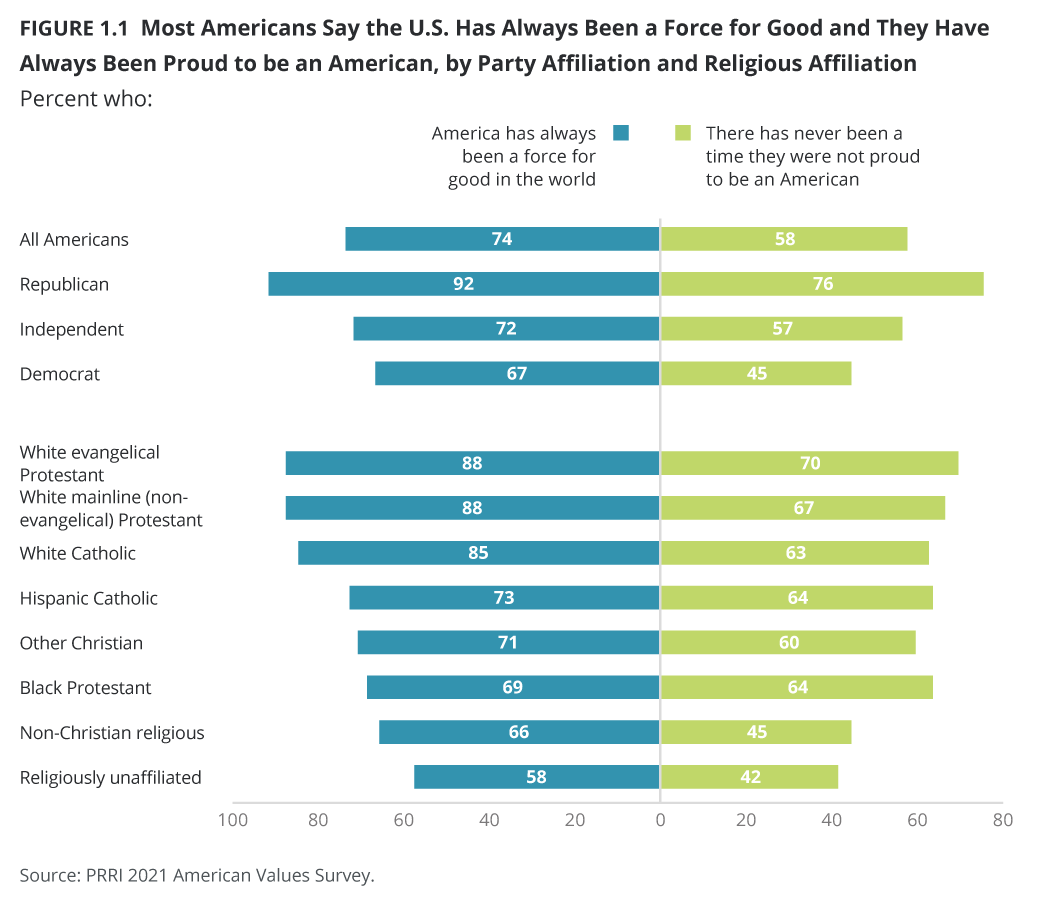
Proud to Be an American?
When Americans were asked if there has ever been a time when they were NOT proud to be American, 41% say yes and 58% say no. The proportion who say they have experienced a time when they were not proud to be American has steadily increased, from 31% in 2013 and 35% in 2015 to 41% today.
One in four Republicans (24%), 43% of independents, and a majority of Democrats (54%) say that at some point in their lives they have not been proud to be American. These opinions have remained consistent among Republicans (23%), but independent and Democrat agreement has increased by double digits since 2013 (30% and 36%, respectively).
Religiously unaffiliated Americans (57%) and members of non-Christian religions (55%) are the only religious groups where the majority say there has been a time when they were not proud to be American. Less than four in ten of all other religious groups say there was a time when they were not proud to be American: white Catholics (37%), other Christians (36%), Black Protestants (35%), Hispanic Catholics (33%), white mainline (non-evangelical) Protestants (32%), and white evangelical Protestants (29%).
A Divinely Ordained Role for America
Compared to 2013, significantly fewer Americans today believe that God has granted America a special role in human history. In 2013, nearly two-thirds of Americans (64%) agreed with this statement, compared to only 29% who disagreed. Today, belief in this statement has dropped a massive 20 percentage points, to 44%, with a majority of Americans (53%) now disagreeing that God has granted America a special role in human history.
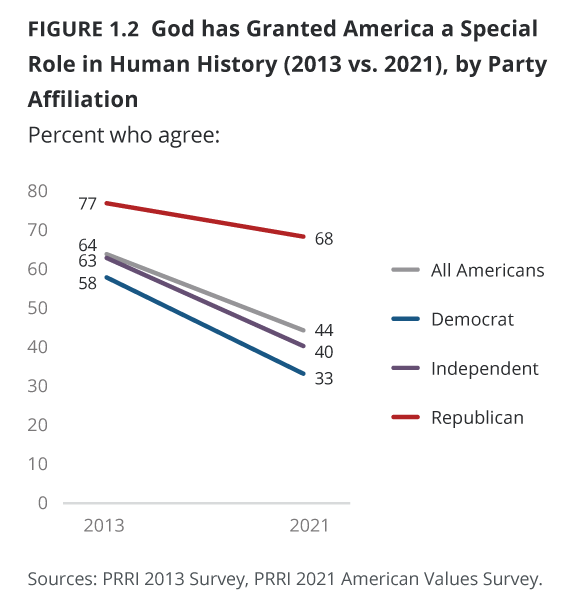
Republicans (68%) are twice as likely as Democrats (33%) to agree that God has granted America a special role in human history. Independents (40%) are slightly less likely to think this way than all Americans are. Notably, belief in this statement has dropped across all partisan groups since 2013, including 25 percentage points among Democrats (from 58% to 33%), 23 percentage points among independents (from 63% to 40%), and nine percentage points among Republicans (from 77% to 68%).
Among all religious groups, white evangelical Protestants (75%) are the most likely to agree that God has granted America a special role in human history, a significant decline from 84% in 2013. Two-thirds of Black Protestants (67%) and 55% of other Christians also agree with this idea, as do half of Hispanic Catholics (50%). Less than half of white mainline (non-evangelical) Protestants (46%) and white Catholics (46%) agree, substantial decreases from 75% and 60%, respectively, in 2013, while even fewer members of non-Christian religions (29%) and religiously unaffiliated Americans (18%) think this way. Unaffiliated Americans also declined significantly, from 40% in 2013.[3]
Has American Culture Changed for Better or for Worse Since the 1950s?
Americans are divided on whether American culture and way of life have mostly changed for the better or for the worse since the 1950s (47% vs. 52%). This is a notable shift from 2020, the final year of Donald Trump’s presidency and an election year, when a majority of Americans (55%) said that American culture and way of life had mostly changed for the better since the 1950s, compared to 44% who said it had changed for the worse.
Only 29% of Republicans today say that American culture and way of life have changed for the better since the 1950s, a substantial decrease from 46% in 2020 and a return to their opinion in 2016 (31%), prior to the election of former President Trump. Most Republicans (70%) say American culture and way of life have changed for the worse since the 1950s. By contrast, a majority of Democrats (63%) think that American culture and way of life have changed for the better, much the same as in 2020 (62%). Independents closely resemble the general population (48% better) and have also declined in this view since 2020 (57% better).
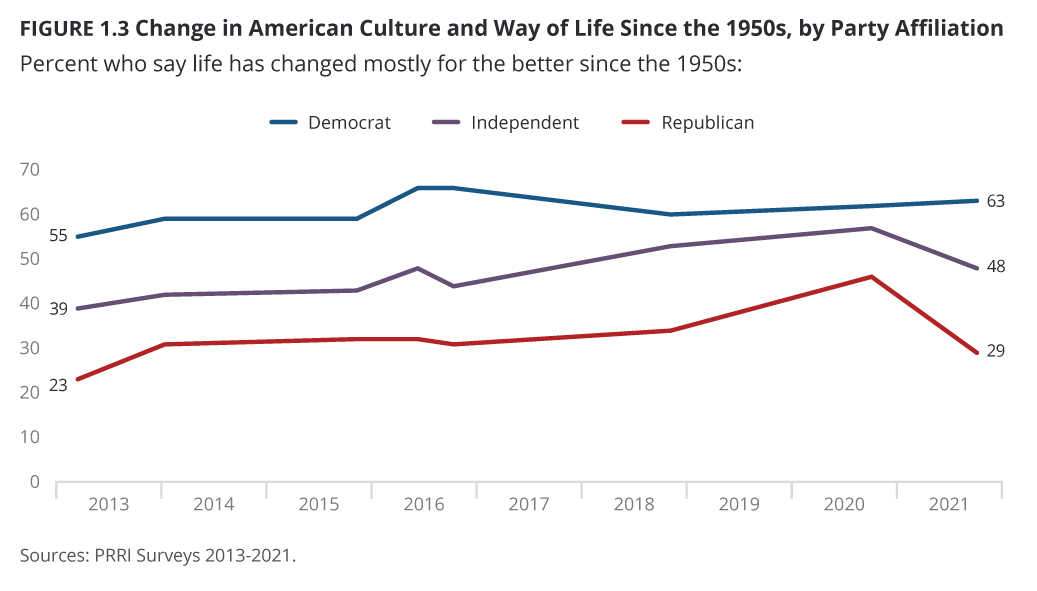
White Christian religious groups also show a considerable decline in the proportion who say American culture and way of life has changed for the better since the 1950s compared to 2020, but like Republicans, they have generally returned to views reminiscent of those they held in 2016, prior to Trump’s election as president. White evangelical Protestants (30% today, 43% in 2020), white Catholics (40% today, 53% in 2020), and white mainline (non-evangelical) Protestants (43% today, 53% in 2020) have all declined 10 or more percentage points in this belief. Smaller shifts took place among religiously unaffiliated Americans (58% today, 66% in 2020), Black Protestants (50% today, 57% in 2020), and Hispanic Catholics (51% today, 58% in 2020). Only non-Christian religious Americans (60% today, 55% in 2020) and other Christians (44% today, 47% in 2020) did not significantly change over the past year.
American Identity: What Makes Someone “Truly American”
More than nine in ten Americans say that it is somewhat or very important to being “truly American” to believe in individual freedoms, such as freedom of speech (slightly up from 91% in 2018 to 95% today), to believe that every citizen should be able to vote in elections (93%), to accept people of diverse racial and religious grounds (up from 86% in 2018 to 92% today), and to respect American political institutions and laws (91%). Nearly eight in ten (79%) say it is somewhat or very important to being truly American to be able to speak English.[4] This percentage has gone down consistently, from 89% in 2015 to 83% in 2018 and 79% today.
Fewer Americans, but still a majority, think it is very or somewhat important to being truly American to believe that capitalism is the best economic system (59%) and to believe in God (56%). Thinking a belief in God is important to being truly American declined substantially, from 69% in 2015 to 52% in 2018. Republicans are significantly more likely than Democrats to think that both belief that capitalism is the best economic system (77% and 50%, respectively) and belief in God (78% and 45%, respectively) are important to being truly American. Independents closely mirror all Americans. Most religious groups have similar beliefs, but members of non-Christian religions and religiously unaffiliated Americans are less likely than Christian groups to say that believing capitalism is the best economic system (50% and 44%, respectively) and believing in God (40% and 21%, respectively) are important to being truly American.
Less than half of Americans think being born in America (48%, substantially down from 58% in 2015, but similar to 50% in 2018) is somewhat or very important to being truly American. Most Republicans (62%) say it is important to be born in America, compared to 44% of independents and 43% of Democrats. Majorities of Black Protestants (70%), white evangelical Protestants (58%), and white Catholics (54%) agree that being born in the country is important for being truly American. Other Christians (52%), white mainline (non-evangelical) Protestants (51%), and Hispanic Catholics (49%) are divided over this question. Members of non-Christian religions (39%) and the religiously unaffiliated (33%) are the least likely to think that being born in America is important to being truly American.
Just over four in ten Americans believe that being Christian (43%, substantially down from 53% in 2015 and 39% in 2018) is somewhat or very important to being truly American. Republicans (63%) are more likely than independents (37%) and Democrats (35%) to say that being Christian is important to being truly American. Solid majorities of white evangelical Protestants (76%) and Black Protestants (75%) say that being Christian is important to being truly American. Around half of Hispanic Catholics (52%), white mainline (non-evangelical) Protestants (49%), white Catholics (46%), and other Christians (46%) think the same. Only one in ten religiously unaffiliated Americans (12%) and members of non-Christian religions (9%) say that being Christian is important to being truly American.
Less than one in five Americans (17%) believe that being of Western European heritage is important for being truly American. About one in five or fewer Americans across party and religious affiliations think that Western European heritage is important to being truly American. Republicans (21%) are slightly more likely to say this than independents (15%) and Democrats (17%) are.
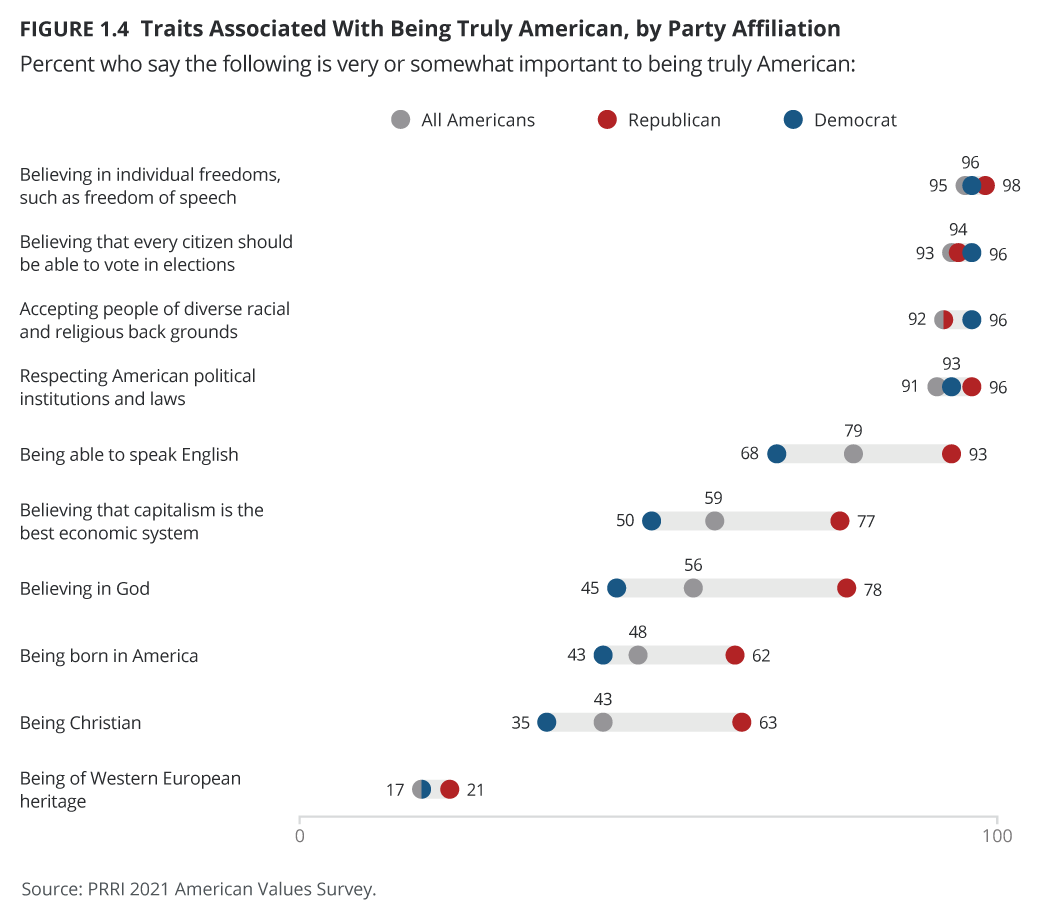
Support for Racial and Religious Pluralism in America
Racial Diversity
When asked to put themselves on a scale where one end is the statement “I would prefer the U.S. to be made up of people from all over the world” and the other end is the statement “I would prefer the U.S. to be a nation primarily made up of people of Western European heritage,” almost half of Americans (49%) mostly agree that the U.S. should be a diverse country made up of people from all over the world. More than four in ten (43%) place themselves in the middle of the scale, while just 8% say they would prefer the U.S. to be made up of people of Western European heritage. These shares have not changed meaningfully since 2018.[5]
Three in ten Republicans (30%), compared to a slim majority of independents (53%) and more than six in ten Democrats (64%), mostly agree that they prefer the U.S. to be made up of people from all over the world. Republicans (57%) are more likely than independents (41%) and Democrats (31%) to place themselves in the middle of the scale. Thirteen percent of Republicans mostly agree they would prefer a country of mostly Western European heritage (13%), compared to 7% of independents and 5% of Democrats.
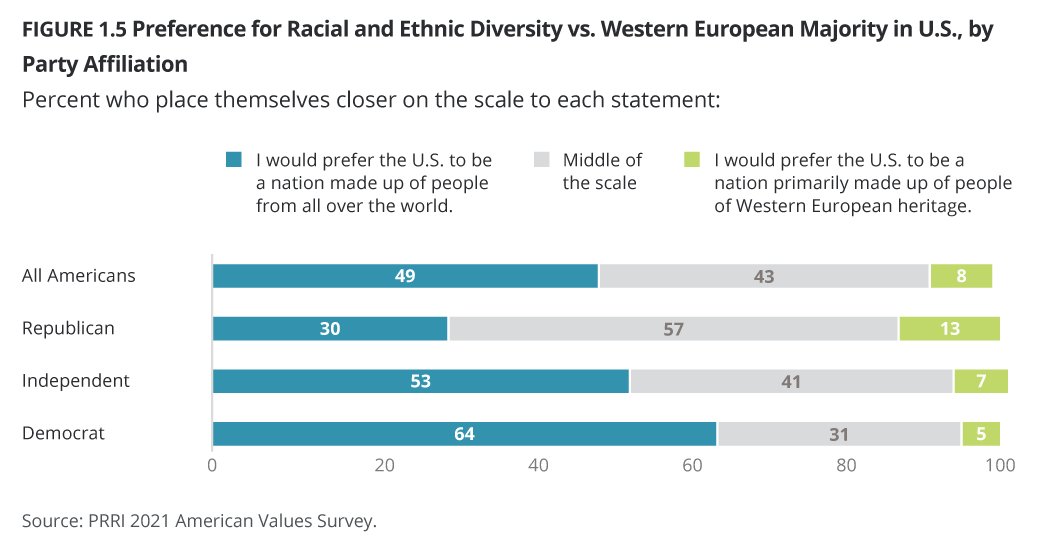
White Christians are less likely than Christians of color and non-Christians to express a preference for racial diversity. Four in ten or less white mainline (non-evangelical) Protestants (40%), white Catholics (36%), and white evangelical Protestants (33%) mostly agree they prefer the U.S. to be made up of people from all over the world. By contrast, majorities of non-Christian religious Americans (66%), religiously unaffiliated Americans (64%), Hispanic Catholics (57%), Black Protestants (56%), and other Christians (51%) express a preference for a racially diverse country.
White Americans are less likely than other Americans to express a preference for racial diversity. Less than half of white Americans (45%) prefer the U.S. to be made up of people from all over the world, compared to majorities of multiracial Americans (51%), Hispanic Americans (54%), Black Americans (58%), and those who identify as another race (63%).[6] White Americans are divided by education: 38% of white Americans without four-year college degrees, compared to 59% of white Americans with at least a four-year degree, prefer racial diversity.
Religious Diversity
Americans are more divided on religious diversity. When asked to put themselves on a scale where one end is the statement “I would prefer the U.S. to be made up of people belonging to a wide variety of religions” and the other end is the statement “I would prefer the U.S. to be a nation primarily made up of people who follow the Christian faith,” about four in ten (38%) mostly agree with the first statement, while approximately one-quarter (24%) mostly agree with the second statement and 38% position themselves in the middle of the scale.[7] These ratings are also mostly unchanged since 2018, although the proportion who mostly agree with the religious diversity statement has increased slightly, from 34% to 38% now.
There are deep divides along partisan and religious lines in preferences for religious diversity. Only 17% of Republicans, compared to 41% of independents and 55% of Democrats, mostly prefer the U.S. to be made up of people belonging to a wide variety of religions. Four in ten Republicans (38%), compared to 20% of independents and 14% of Democrats, prefer the U.S. to be a nation primarily made up of people who follow the Christian faith. These patterns are also consistent with findings from 2018.
Non-Christian religious Americans (71%) and religiously unaffiliated Americans (65%) are the only major religious groups among whom a majority express a preference for religious diversity. Less than four in ten Hispanic Catholics (38%), one-third of white mainline (non-evangelical) Protestants (33%), and about three in ten Black Protestants (31%), white Catholics (30%), and other Christians (30%) express a preference for religious diversity. White evangelical Protestants (13%) stand out as the least likely group to express a preference for religious diversity. Indeed, white evangelical Protestants are the only religious group in which a majority (57%) express a preference for a mostly Christian country.
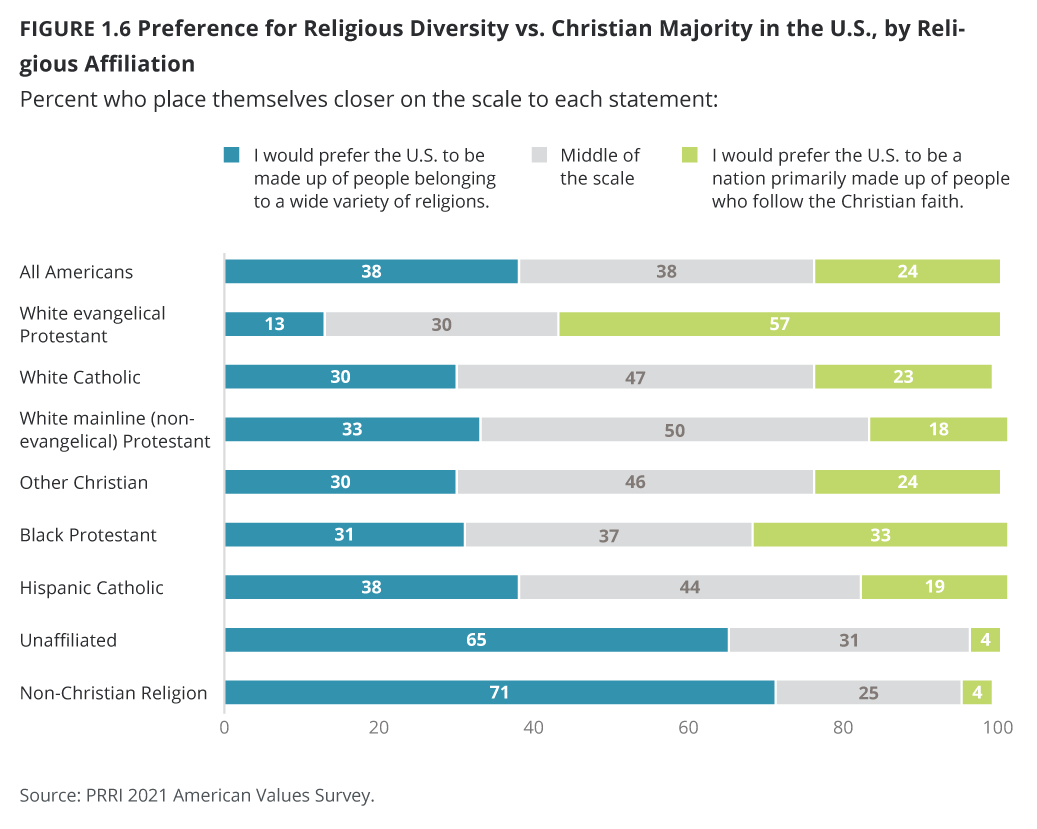
Ideals Are Still Achievable
Three in four Americans (75%) agree with the statement “It is still possible for the U.S. to achieve the ideal of our national motto ‘E Pluribus Unum’: ‘From many people, one,’” compared to 22% who disagree. This is consistent across various demographics where solid majorities agree with this statement, including party, religious affiliation, race, education, gender, region, and area of residence.
Perceptions of Increasing Diversity
Is Increasing Diversity a Strength or Weakness?
About two-thirds of Americans (65%) say that the fact that “the United States has a diverse population, with people of many different races, ethnicities, religions, and backgrounds,” makes the country stronger, including 40% who say it makes the country much stronger. One in four (25%) say this diversity makes the country neither stronger nor weaker, and only 9% say diversity makes the country weaker. These opinions have remained stable since 2018.
More than eight in ten Democrats (82%), compared to less than half of Republicans (47%), say that diversity makes the country stronger. Indeed, Republicans are five times more likely than Democrats to say that diversity makes the country weaker (16% vs. 3%). Independents closely resemble the general population, with two-thirds (67%) saying diversity makes the country stronger.
Majorities of all religious groups say that diversity makes the country stronger, but white Christian groups, including white evangelical Protestants (54%), white Catholics (58%), and white mainline (non-evangelical) Protestants (62%), are the least likely to do so. More than seven in ten religiously unaffiliated Americans (71%), Hispanic Catholics (73%), Black Protestants (76%), and members of non-Christian religions (80%) say diversity makes the country stronger.[8]
White Americans (61%) are less likely than Black Americans (70%) and Hispanic Americans (71%) to say that diversity makes the country stronger.[9] However, white Americans with college degrees are significantly more likely than those without college degrees to agree (78% vs. 54%).
Reactions to the Declining White Population in the 2020 Census
About one in four Americans (23%) say that the 2020 U.S. Census finding that the white population of the United States has decreased for the first time in the country’s history is mostly positive, while less than one in five (17%) say it is mostly negative. A majority of Americans (59%) say it doesn’t matter either way.
Democrats are four times more likely to say the decline of the white population in the 2020 Census is mostly positive vs. negative (39% vs. 9%). Republicans, by contrast, are more than five times less likely to say this change is positive vs. negative (6% vs. 33%). Independents are nearly twice as likely to say this change is positive vs. negative (23% vs. 13%).
White Americans (16%) are less likely than Black Americans (38%) and Hispanic Americans (34%) to say that the decline of the white population in the United States is mostly positive, but those with college degrees are twice as likely as those without college degrees to think this way (23% vs. 11%).
The belief that the decline of the white population in the United States is mostly positive is higher among those who are under 50 years old (28%) than those over 50 (17%).
Less than one in five Americans (15%) agree with the idea than an America where most people are not white bothers them, while 83% disagree, including a majority who strongly disagree (55%). These attitudes are similar to those recorded last year (18% agree, 81% disagree) and in May 2016 (21% agree, 78% disagree) and February 2013 (14% agree, 84% disagree). The vast majority of Americans across all demographics disagree with this idea.
Cultural Change and the Country’s Identity
Four in ten Americans (41%) agree with the statement “Things have changed so much that I often feel like a stranger in my own country,” compared to 57% who disagree. These opinions have shifted slightly since 2018, when 47% agreed and 51% disagreed.
Three in ten Democrats (31%) agree with the idea that things have changed so much that they often feel like strangers in their own country, compared to 39% of independents and 56% of Republicans. Republicans who most trust far-right news outlets (78%) and Republicans who most trust Fox News (61%) are more likely than Republicans overall to agree with this statement.
Similarly, a slim majority of Americans (52%) agree that “Today, America is in danger of losing its culture and identity,” while 45% disagree. These opinions have shifted only modestly since 2016, when the question was first asked. In 2016, the majority of Americans (55%) agreed with this statement, compared to 41% who disagreed.
There is nearly a 50-percentage-point gap between Republicans (80%) and Democrats (33%) on this question. Independents mirror all Americans closely (50% agree vs. 49% disagree). Nearly all Republicans who most trust far-right news outlets (98%) and Fox News (89%) agree that America is in danger of losing its culture and identity.
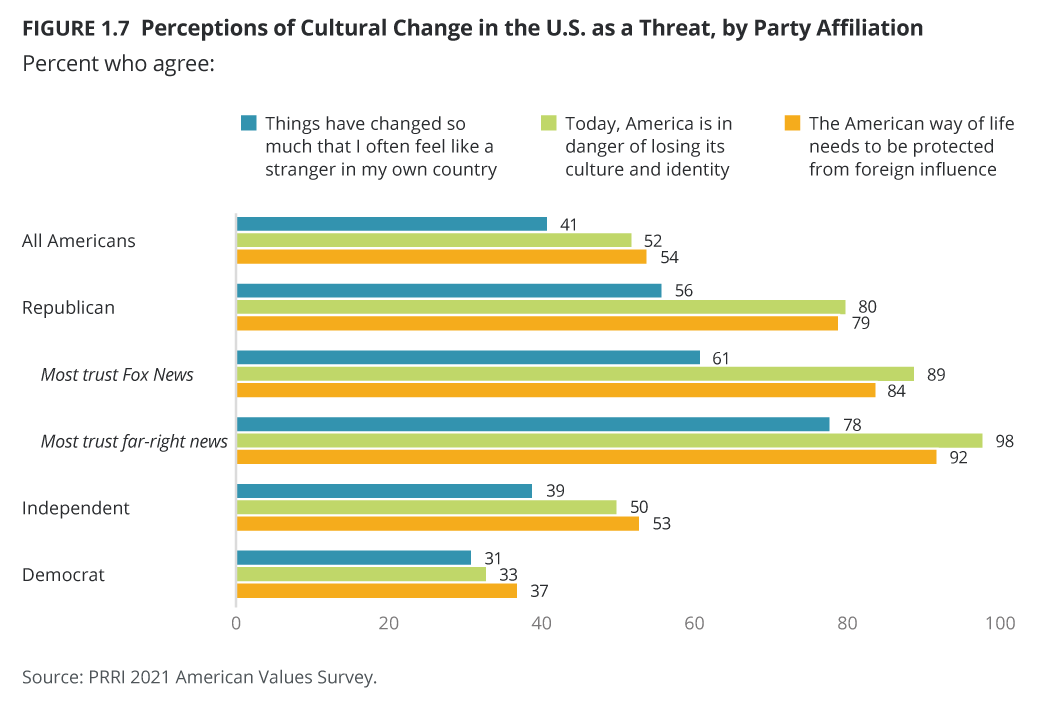
White evangelical Protestants (78%) are the most likely to agree with the idea that America is in danger of losing its culture and identity, followed by 64% of white Catholics, 59% of white mainline (non-evangelical) Protestants, 58% of other Christians, and 52% of Black Protestants. About four in ten Hispanic Catholics (43%), members of non-Christian religions (37%), and religiously unaffiliated Americans (35%) think the same.
Not surprisingly, white Americans (57%) are more likely than Black Americans (49%), Hispanic Americans (43%), and Americans who identify as another race (40%) to agree that America is in danger of losing its culture and identity, but they do not differ significantly from multiracial Americans (54%). White Americans with college degrees are less likely than those without college degrees to hold this belief (44% vs. 63%).
Similar patterns also emerge on whether “The American way of life needs to be protected from foreign influence.” A majority of Americans (54%) agree with the statement, and these opinions have remained stable since 2013. The vast majority of Republicans (79%) agree that the American way of life needs to be protected from foreign influence, compared to a smaller majority of independents (53%) and 37% of Democrats. Nearly all Republicans who trust far-right news outlets (92%) and Fox News (84%) agree with this statement.
Immigrants and Immigration: Strength or Threat?
Immigrants
A majority of Americans (56%) say that in general, newcomers strengthen American society, compared to four in ten (40%) who say that newcomers threaten traditional American customs and values. These opinions have shifted over time. In 2011, 53% said newcomers strengthen American society. That proportion increased to 60% in 2018 and is down slightly today, to 56%. By contrast, in 2011, 42% said newcomers threaten traditional American customs and values; this went down to 37% in 2018 and remains about the same today (40%).
Republicans (28%) are less likely to have positive views of immigrants today than they were in 2018 (34%) and in 2011 (39%), and have grown more likely to believe that immigrants threaten American values (71% today, 65% in 2018, and 55% in 2011). The vast majority of Republicans who most trust far-right media outlets (90%) and Fox News (80%) say newcomers threaten traditional American customs and values. By contrast, more than three in four Democrats (78%) say immigrants strengthen American society, unchanged from 2018 (76%) but up from 2011 (62%). Six in ten independents (60%) also say immigrants strengthen American society.
White Americans (52%) are less likely than Black Americans (70%) and Hispanic Americans (62%) to say that newcomers strengthen American society, but do not differ significantly from Americans who identify as another race (61%) and multiracial Americans (61%). White Americans with college degrees are more likely than those without college degrees to hold positive opinions of newcomers (69% vs. 43%). Hispanic Americans are less likely to believe that newcomers strengthen American society today (62%) than they were in 2018 (72%) but remain similar to 2011 levels (64%).
Similarly, six in ten Americans (61%) say that immigrants today strengthen our country because of their hard work and talents, compared to one-third (35%) who say that immigrants are a burden on our country because they take jobs, housing, and health care. These opinions have remained stable since 2018 (64% vs. 33%) but have notably shifted from 2010, when the question was first asked (45% vs. 43%).
However, partisans are deeply divided over the impact of immigration. One-third of Republicans (32%), two-thirds of independents (65%), and more than eight in ten Democrats (82%) say that immigrants strengthen the country because of their hard work and talents. Two-thirds of Republicans (65%) say instead that immigrants are a burden because they take jobs, housing, and health care. More than three in four Republicans who most trust far-right media outlets (79%) and Fox News (76%) agree that immigrants are a burden to the country. In 2010, 35% of Republicans, 45% of independents, and 55% of Democrats said that immigrants strengthen the country because of their hard work and talents.
Immigration Policies
About six in ten Americans (62%) say that immigrants living in the U.S. illegally should be allowed a way to become citizens provided they meet certain requirements. Less than one in five (14%) say they would prefer undocumented immigrants to be eligible for permanent residency status but not citizenship, and about one in five (22%) say all immigrants living in the U.S. illegally should be deported. Overall, support for a path to citizenship for undocumented immigrants has been remarkably consistent since 2013.
However, Democrats have grown more supportive of this policy, from 71% in 2013, when the question was first asked, to 76% today. Republicans have become less likely to say that immigrants living in the U.S. illegally should be allowed a way to become citizens provided they meet certain requirements (43%) than they were in 2013 (53%). Today, 13% of Republicans say they would prefer undocumented immigrants to be eligible for permanent residency status but not citizenship, and 44% say all immigrants living in the U.S. illegally should be deported. Majorities of Republicans who rely on Fox News (55%) and far-right media outlets (64%) as their main sources of information say that all immigrants living in the U.S. illegally should be deported.
With the exception of white evangelical Protestants, majorities of all religious groups support allowing undocumented immigrants to become citizens, including three in four Black Protestants (75%), 70% of Hispanic Catholics, 69% of religiously unaffiliated Americans, 65% of other Christians, 59% of white mainline (non-evangelical) Protestants, 55% of members of non-Christian religions, and 54% of white Catholics. White evangelical Protestants have become less likely to support allowing undocumented immigrants to become citizens today (47%) than they were in 2013 (56%), and have become substantially more likely to say all immigrants living in the U.S. illegally should be deported (42%), compared to 30% in 2013. White Catholics have also become less supportive of a path to citizenship today (54%) than they were in 2013 (62%).
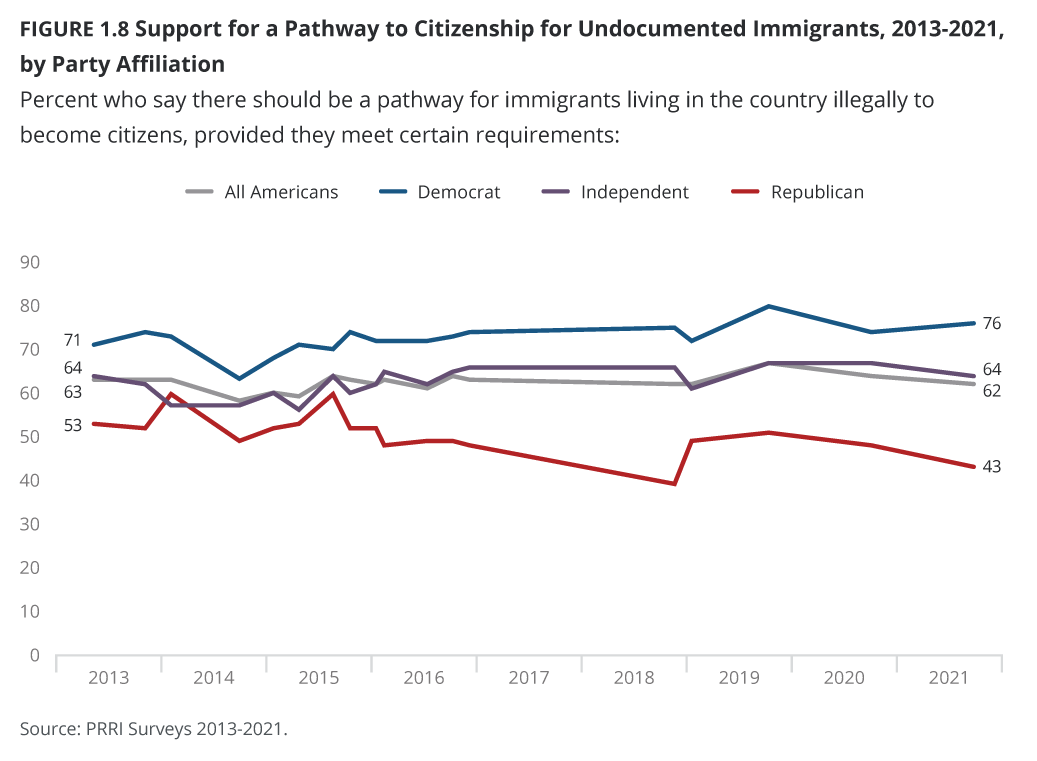
A slim majority of Americans oppose building a wall along the U.S. border with Mexico (53%), compared to 45% who favor it. These views have shifted little since 2016, when the question was first asked (58% oppose vs. 41% favor).
More than eight in ten Republicans (84%) support a border wall, while a similar number of Democrats (80%) oppose it. Nearly all Republicans who trust far-right media outlets (99%) and Fox News (99%) most among television news sources favor this policy. Independents roughly mirror Americans in general (56% oppose vs. 43% support).
Americans who live in the West (34%) and in urban areas (34%) are less likely to support this policy than those who live in the Northeast (49%), the South (48%), the Midwest (47%), suburban areas (46%), and rural areas (60%).
Nearly two-thirds of Americans (64%) favor allowing immigrants brought illegally to the U.S. as children, better known as Dreamers, to gain legal resident status, while one-third (34%) are opposed. Support for this policy has remained stable since 2019. Republicans (44%) are less likely than independents (70%) and Democrats (79%) to favor this policy. In fact, large majorities of Republicans who trust far-right media outlets (75%) and Fox News (68%) most among television news sources oppose this policy. While Republicans and independents have not shifted their opinions significantly since 2019 (42% and 67%, respectively), Democrats have grown more supportive since 2019 (74%).
With the exception of Republicans (44%) and white evangelical Protestants (47%), majorities of all other demographic groups favor this policy, including gender, race, education, age, region, and geographic location.
Four in ten Americans (40%) say more restrictive immigration policies have made the U.S. safer from terrorism, compared to 15% who say it has made the country less safe and 42% who say such policies have made no difference. The partisan split on this question is wide: 65% of Republicans say more restrictive immigration policies have made the country safer, compared to 38% of independents and 28% of Democrats. The largest proportions of independents (48%) and Democrats (52%) say more restrictive immigration policies have not made a difference.
Views of Islam, 20 Years After 9/11
Over the last five years, Americans have become less likely to believe that Islam is at odds with American values and ways of life, although the trend shows some fluctuation (56% agreed in 2015, 43% agreed in 2020, and 50% disagreed in 2021). Today, 50% agree.
Republicans (74%) are more than twice as likely as Democrats (35%) to agree that the values of Islam are at odds with American values and ways of life. In fact, 89% of Republicans who most trust far-right media outlets and 80% who most trust Fox News agree. These opinions have increased significantly from last year (67% of Republicans and 26% of Democrats agreed) but remain similar to those recorded in 2015 (76% of Republicans and 43% of Democrats agreed). Over time, independents mirror all Americans closely.
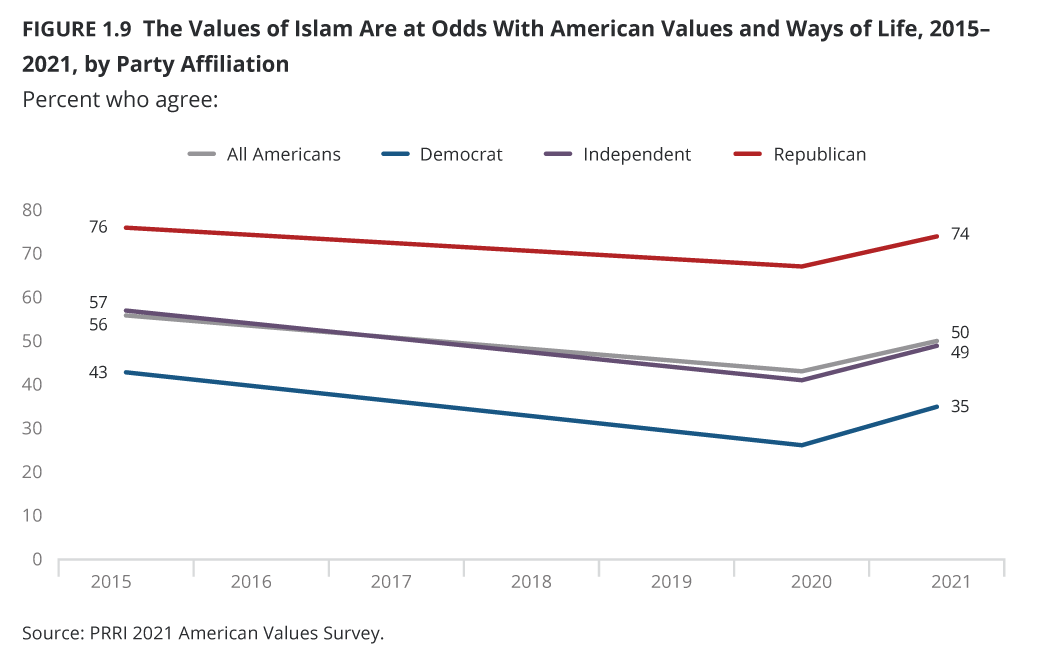
There is a lot of variation on this question by religious affiliation. White evangelical Protestants (75%) are the most likely to agree with the idea that the values of Islam are at odds with American values and ways of life. About six in ten white Catholics (58%) and a slim majority of white mainline (non-evangelical) Protestants (53%) also agree. Black Protestants (50%), Hispanic Catholics (49%), and other Christians (48%) are more divided, while only a minority of members of non-Christian religions (42%) and the religiously unaffiliated (35%) agree.
Race and Racism
Progress in Achieving True Racial Equality
Only four in ten Americans (42%) agree that “We have made great progress in achieving true racial equality in the U.S.,” compared to a majority (55%) who disagree. Republicans (56%) are more likely than independents (48%) and Democrats (29%) to agree. Nearly seven in ten Democrats (69%) disagree with this statement.
Majorities of Black Protestants (70%), religiously unaffiliated Americans (63%), other Christians (59%), Hispanic Catholics (56%), and members of non-Christian groups (54%) disagree with this idea, while white Catholics (51% disagree) and white mainline (non-evangelical) Protestants (48% disagree) are more divided. White evangelical Protestants (45%) are the religious group least likely to disagree that the U.S. has made great progress in achieving true racial equality; 54% agree.
White Americans (51% disagree vs. 46% agree) and multiracial Americans (49% disagree vs. 49% agree) are divided on this question, while majorities of Black Americans (68%), Americans who identify as another race (58%), and Hispanic Americans (57%) disagree that the U.S. has made great progress in achieving true racial equality. Interestingly, there is no difference among white Americans by education status: Those with four-year college degrees (53%) and without (51%) are similarly likely to disagree that the U.S. has made great progress toward racial equality.
Police Killings of Black Americans: Isolated Incidents or Part of a Pattern?
Currently, around four in ten Americans (43%) feel that the recent killings of Black Americans by police are isolated incidents, compared to 54% who say these killings are part of a broader pattern of how police treat Black Americans. Similar shares of Americans agreed that these killings were isolated incidents in Sept. 2020 (43%) and in 2018 (45%). Attitudes have shifted, however, since Oct. 2015, when a majority of Americans (53%) said these police killings were isolated incidents and 44% said these incidents were part of a broader pattern.
Around eight in ten Republicans (79%), compared to 45% of independents and 15% of Democrats, believe that killings of Black Americans by police are isolated incidents rather than part of a broader pattern of how police treat Black Americans. These rates are nearly identical to those recorded in Sept. 2020. About nine in ten Republicans who trust far-right media outlets (91%) and Fox News (88%) most for television news say that these are isolated incidents.
Democrats are significantly less likely than they were in both 2018 (26%) and 2015 (32%) to believe police killings of Black men are isolated incidents. These shifts among Democrats are largely driven by white Democrats’ views (18%, from 43% in 2015) becoming more aligned with the views of Black Americans (14%) over the last six years. White independents have trended downward as well, with 65% saying killings of Black Americans were isolated incidents in 2015 and 51% in 2021. By contrast, white Republicans have not changed their views since 2015 (85%).
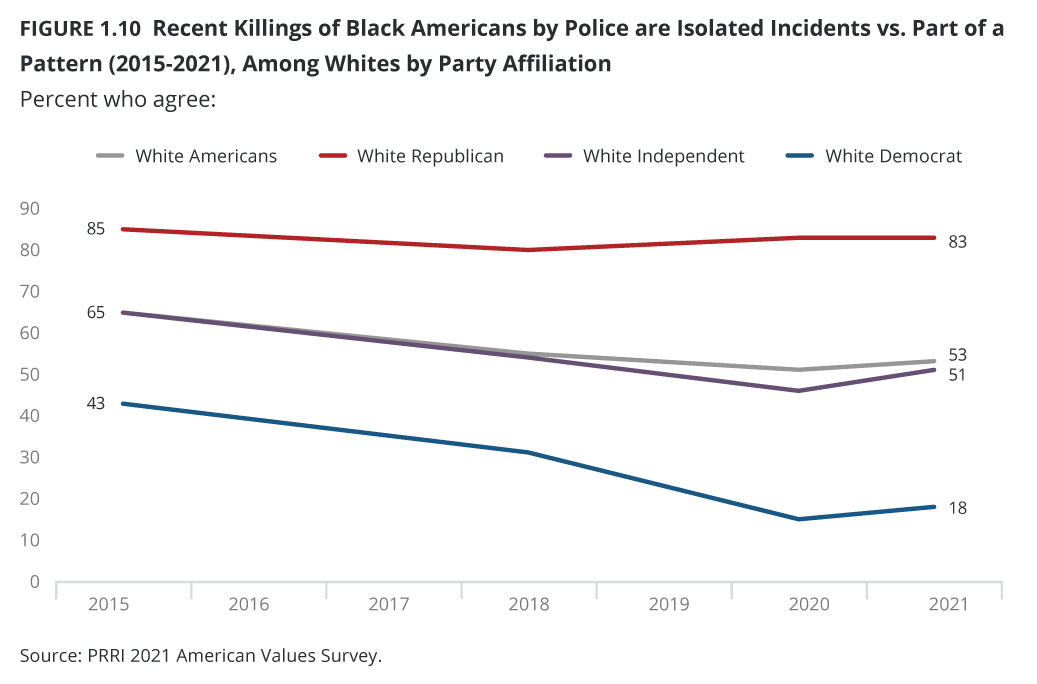
White Americans (53%) are much more likely than Americans who identify as another race (32%), Hispanic Americans (29%), and Black Americans (14%) to say that killings of African Americans by police are isolated incidents rather than part of a pattern of how police treat African Americans, but they do not differ significantly from multiracial Americans (47%). White Americans without college degrees are more likely to think this way than those with college degrees (59% vs. 43%).
Critical Race Theory
One-third of Americans (34%) say they have heard nothing at all about critical race theory, 44% say they have heard a little, and only 19% say they have heard a lot. There are no significant differences among partisans, but Republicans who most trust far-right news outlets (37%) and Fox News (30%) are more likely than Republicans overall (20%) to say they have heard a lot about critical race theory. About one in three Americans or less across all demographic groups say they have heard a lot about critical race theory.
Despite some high-profile flare-ups over this issue in the media, there is a broad consensus about what history should be taught in schools. When asked what children should be taught in schools, the vast majority of Americans (84%) agree that “We should teach American history that includes both our best achievements and our worst mistakes as a country,” compared to only 13% who say “We should teach American history that focuses on what makes this country exceptional and great.”
Vast majorities of all demographic groups say that we should teach American history that includes both our best achievements and our worst mistakes as a country, including Republicans (80%), independents (86%), and Democrats (90%).
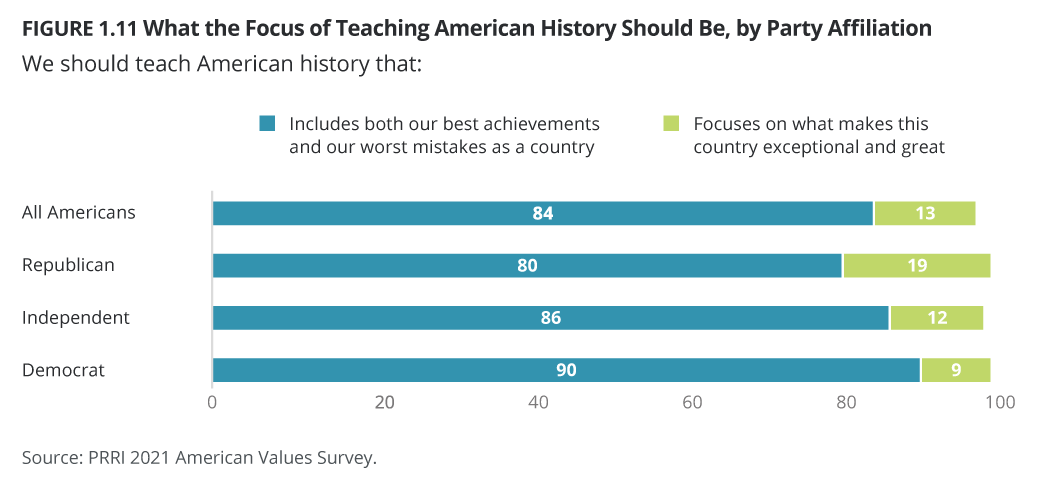
Economic Changes and Anxiety in America
Sources of and Solutions to Economic Problems
Americans are twice as likely to believe that “The economic issues facing the country are primarily a result of long-term problems” (65%) than to believe that “The economic issues facing the country are primarily a result of the hardships caused by the coronavirus pandemic” (32%).
Americans across the partisan spectrum agree that there are long-term problems with the economy rather than short-term hardships caused by the coronavirus. Independents (69%) and Democrats (68%) are slightly more likely than Republicans (60%) to agree that the economy faces long-term problems. Republicans who most trust Fox News (52%) are less likely than those who trust far-right outlets (61%), mainstream news (62%), or do not watch TV news (65%) to say that the economy has been facing long-term problems.[10]
Solid majorities of each racial and ethnic group believe that the country’s economic problems are the result of long-term problems and not just the result of the pandemic. Around six in ten or more Hispanic Americans (58%), Black Americans (64%), white Americans (67%), Americans of other races or ethnicities (68%), and multiracial Americans (73%) believe the country’s economic struggles are the result of long-term problems.
Consistent with this diagnosis of the country’s economic problems, Americans are more likely to agree that “investing in government programs to help American families and rebuild infrastructure” is more important than “reducing government spending to lower the national debt” (58% vs. 40%).
However, there are deep partisan divides here. Just one in four Republicans (25%), compared to 59% of independents and 84% of Democrats, say that it’s more important to invest in government programs than to reduce spending. Republicans who most trust mainstream news sources (38%) are more likely than those who most trust Fox News (21%) or most trust far-right news (7%) to say investing in government programs is more important than reducing the national debt.
There are also substantial divides among religious groups in whether they think it is more important to focus on investing in government programs or reducing the national debt. White Christian groups are least likely to favor investing in government programs, including 29% of white evangelical Protestants, 43% of white Catholics, and 50% of white mainline (non-evangelical) Protestants. More than six in ten other Christians (63%), Hispanic Catholics (68%), non-Christian religious Americans (71%), religiously unaffiliated Americans (72%), and Black Protestants (79%) favor investment in government programs.
White Americans (50%) are much less likely than Americans of other races or ethnicities to believe that the country should invest in government programs that help people instead of shrinking the national debt. Hispanic Americans (64%), multiracial Americans (66%), Americans of other races (70%), and Black Americans (80%) are much more likely to favor investment in government programs over shrinking the national debt. White Americans with college degrees (59%) are much more likely than white Americans with less than a four-year college degree (46%) to say that the government should be investing in programs instead of reducing spending.
Household Economic Situations
The survey finds several indicators of increased economic stress. More than eight in ten Americans (85%) agree with the statement that “The costs of housing and everyday expenses are rising faster than my income,” including a slim majority (51%) who completely agree. Around four in ten Americans (42%) say they are very or somewhat concerned about their ability to pay for basic goods for daily life increasing in cost due to inflation. Around three in ten Americans (31%) say they are very or somewhat concerned about paying their rent or mortgage, 25% are concerned about paying credit card bills, and 20% are concerned about being able to make student loan payments.
Combining these concerns about household expenses into a scale shows that 45% of Americans are concerned with paying for one of these items, 32% are concerned with paying two of the four, 18% are concerned about three of the four, and 5% are concerned about all four.
There are only minimal partisan differences in concerns about paying for household expenses. More than half of Republicans (51%), Democrats (55%), and independents (56%) are concerned with paying at least two of the four household expenses.
Just under half of white Americans (48%) are concerned about paying at least two of the four major household expenses, significantly less than among Black Americans (68%), Hispanic Americans (68%), and Americans of other races (57%).
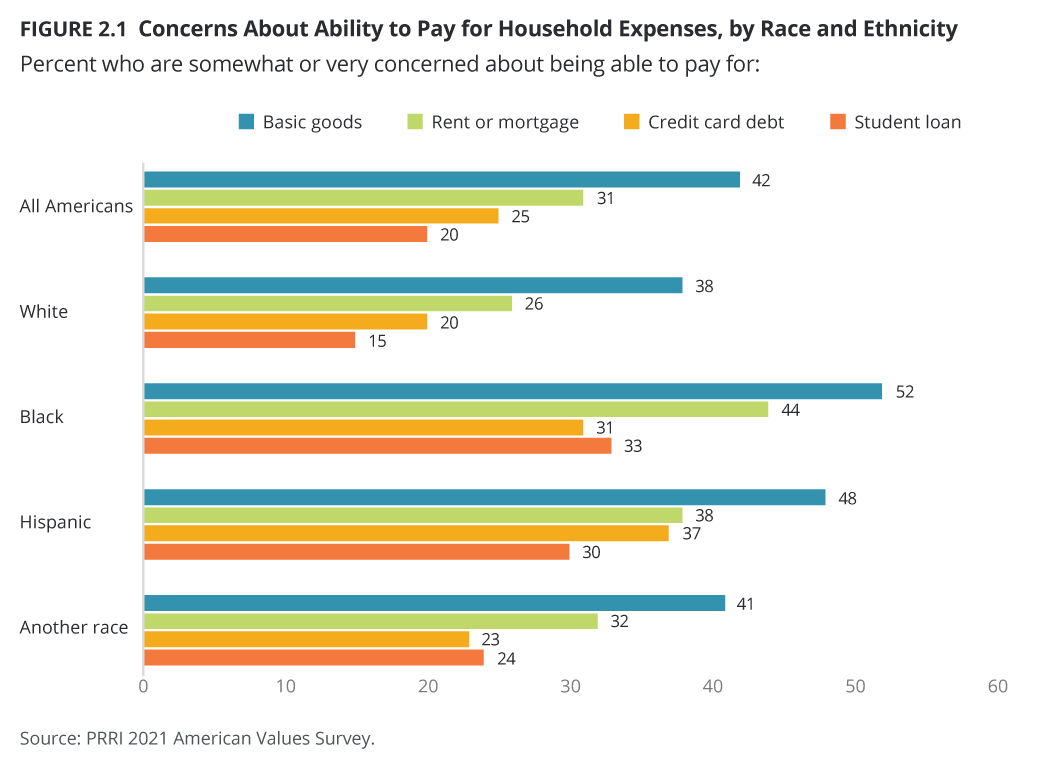
Younger Americans are more likely to be concerned about paying for at least two of the four household expenses tested. Two-thirds of Americans ages 18 to 29 (66%), compared to 61% of those ages 30 to 49, 50% of those ages 50 to 64, and 42% of those over age 65, are concerned about affording two or more household expenses.
Generational Economic Mobility
Americans are more optimistic about past economic mobility than future economic mobility. Just over half of Americans (53%) say that their generation is better off than their parents were, while an identical share (53%) disagree that their generation is better off than the next generation will be.
Majorities of Republicans (57%), Democrats (56%), and independents (53%) believe that their generation is better off than their parents’ generation was; however, Republicans (47%) are slightly less likely than independents (54%) and Democrats (54%) to say that they will not be better off than the next generation will be.
Black Americans (61%) and Hispanic Americans (56%) are more likely than white Americans (51%) to believe that their generation is better off than that of their parents, while Americans of other races (52%) are about as likely as Americans overall to say the same. Black Americans (62%), Hispanic Americans (60%), and Americans of other races (59%) are more likely than white Americans (48%) to say that they are not better off than the next generation will be.
The starkest differences in opinions on generational mobility come along age lines. Americans over age 65 are more than twice as likely as those ages 18 to 29 to say that their generation is better off than their parents’ generation (74% vs. 30%), with Americans ages 30 to 49 (47%) and 50 to 64 (61%) falling in between. Similarly, nearly two-thirds (64%) of those ages 18 to 29 say they are not better off than the next generation, compared to 56% of those ages 30 to 49, 47% of those ages 50 to 64, and 43% of those over age 65.
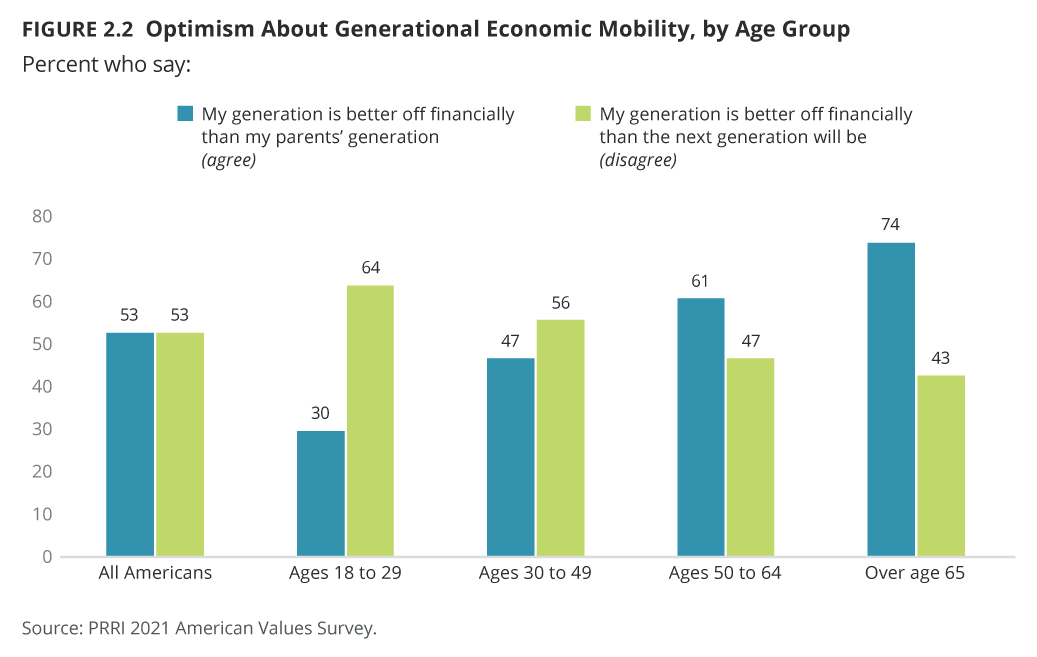
Further complicating the division over generational economic mobility, only 45% of Americans today say that a college education is a smart investment, compared to a majority (54%) who say it is more of a risky investment that may not pay off. This marks a 10-point decline from 2016, when a majority (55%) saw college education as a smart investment. Notably, these shifts may have electoral implications. In 2016, among economic concerns, believing that college was a risky investment was one of the strongest independent predictors of support for Trump.[11]
Confidence in the value of a college education is down among all partisan groups, but large gaps remain. Nearly six in ten Democrats (58%), compared to 42% of independents and 37% of Republicans, say that a college education is a smart investment. Compared to 2016, confidence in the value of a college education has declined 15 percentage points among Republicans (from 52%), seven points among independents (from 49%), and eight points among Democrats (from 66%).
Majorities of Americans of other races (58%) and Hispanic Americans (54%) say that a college education is a good investment, compared to around half of Black Americans (48%) and four in ten white Americans (41%). These shares have declined across the board compared to 2016 (down from 52% among white Americans, 56% among Black Americans, and 68% among Hispanic Americans).
There are deep divides between white Americans by whether they have four-year college degrees, though the gap is shrinking among both groups. Currently, one-third of white non-college-graduate Americans (33%), compared to a solid majority of white college graduates (55%), say that college is a smart investment. In 2016, the education gap was wider, but belief that a college education was a smart investment was also greater: 46% among white non-college graduates and 63% among white college graduates.
Unsurprisingly, Americans with postgraduate degrees (61%) or four-year college degrees (52%) are more likely than those with some college experience but no degree (39%) or a high school degree or less (41%) to say college is a good investment. In 2016, half of Americans with some college experience (50%) or a high school degree or less (51%) felt that college was a good investment.
Americans’ Evolving Identities
Shifts in Identity: Partisanship
Many Americans say that their political views have shifted over the past five years. Similar shares of Americans say they have become more likely to think of themselves as Republicans (25%), less likely to think of themselves as Republicans (22%), have not had their views change either way (22%), or said the question does not apply (29%). This pattern is similar for Democrats, though the net shift toward being more likely to be a Democrat is slightly larger than it is for Republicans. Around three in ten Americans (28%) say they are more likely to consider themselves Democrats, compared to 20% who are less likely to think of themselves that way. One in four Americans have not changed either way (25%) or said the question does not apply (25%).
Among Republicans, 66% say that they have become more likely to think of themselves as Republicans over the past five years, while 7% say they have become less likely and 26% have not changed their views. Among Democrats, just four percent say they are more likely to think of themselves as Republicans and 28% are less likely, while 11% have not changed their views (55% said the question does not apply). Fewer independents have been more likely to think of themselves as Republicans (16%) than less likely (29%), while an additional 29% have not changed (25% said the question does not apply).
Six in ten Democrats (60%) say they have become more likely to think of themselves as Democrats over the past five years, while 7% have become less likely and 30% say their views have not changed. Four percent of Republicans say they are more likely to think of themselves as Democrats, while 34% say they are less likely and eight percent say they have not changed their views (54% said the question does not apply). Among independents, similar shares say they are more likely (21%) or less likely (22%) to think of themselves as Democrats, while 33% have not changed (22% said the question does not apply).
Two religious groups who have nearly opposite voting patterns show increased attachment to opposing political parties. Nearly half of white evangelical Protestants (49%) say that they have become more likely to think of themselves as Republicans over the past five years. A slim majority of Black Protestants (53%) say they have become more likely to think of themselves as Democrats. No other religious groups reported similarly large shifts.
There is evidence that the partisan gap among white Americans with at least a four-year college degree and those without college degrees is continuing to widen. Around one-third of white Americans without four-year college degrees (35%) say they have become more likely to think of themselves as Republicans, while 16% say they are less likely to identify with the GOP. Similarly, 19% of white non-college graduates have become more likely to think of themselves as Democrats, while 24% have become less likely to do so.
Among those with four-year degrees or more, 20% have become more likely to think of themselves as Republicans, while 33% say they are less likely to identify with the GOP; one-third (34%) have become more likely to think of themselves as Democrats, while 21% have become less likely.
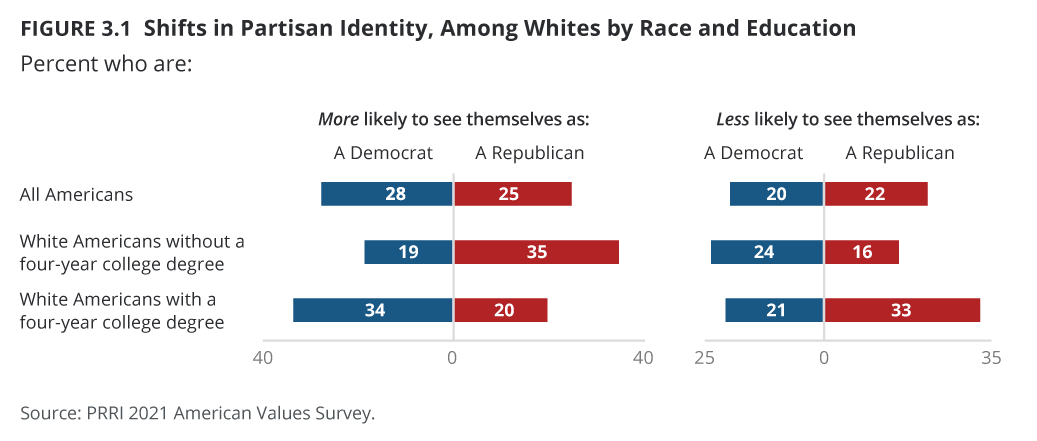
Shifts in Identity: Perceptions of Self As “Religious” and Multi-Religious
Just over one in four Americans (27%) say that they have become more likely to think of themselves as religious over the past five years, while 16% have become less likely. Around four in ten (37%) say they have not changed, and 17% say they have never considered themselves to be religious. Among Americans who say that their religious identity is at least somewhat important to their personal identity, more than four in ten (44%) say they have become more likely to think of themselves as religious, while 11% say they have become less likely.
Republicans (39%) are more likely than independents (25%) and Democrats (22%) to think of themselves as having become more religious over the past five years. Just 9% of Republicans say they have become less religious, a smaller share than among independents (16%) and Democrats (23%).
Slim majorities of white evangelical Protestants (54%) and Black Protestants (51%) say they have become more likely to see themselves as religious over the last year. Smaller shares of other Christians (38%), Hispanic Catholics (33%), white Catholics (26%), non-Christian religious Americans (26%), and white mainline (non-evangelical) Protestants (21%) say they have become more likely to think of themselves as religious. Unsurprisingly, just four percent of religiously unaffiliated Americans say they have become more likely to think of themselves as religious, while 23% have become less likely.
Additionally, 15% of Americans say they were followers or practitioners of a different religion than the one they are now, including 13% of those who say their religion is at least somewhat important to their personal identity. Republicans (11%) are less likely than independents (18%) and Democrats (16%) to say they followed a different religion than they follow or practice now. Non-Christian religious Americans (27%) and religiously unaffiliated Americans (25%) are more likely than other Christians (16%), Black Protestants (12%), white evangelical Protestants (10%), white Catholics (9%), white mainline (non-evangelical) Protestants (8%), and Hispanic Catholics (4%) to say they followed a different religion than they do now.
Shifts in Identity: Perceptions of Self As “Patriotic” or “Typical American”
Around one-third of Americans (32%) say they have become more likely to think of themselves as patriotic over the past five years, while 14% are less likely and 42% have not changed. Around three in ten Americans (29%) say that they have been more likely to think of themselves as typical Americans over the past five years, while 16% say they have become less likely and 46% say they have not changed.
A slim majority of Republicans (51%) report that they have become more likely to think of themselves as patriotic over the past five years, compared to almost half as many independents (29%) and Democrats (23%). A larger share of Democrats (21%) than independents (12%) or Republicans (8%) say they have become less likely to think of themselves as patriotic. Around two-thirds of Republicans who most trust far-right news outlets (66%) or Fox News (63%) say they have become more likely to think of themselves as patriotic, compared to smaller shares of those who trust mainstream news (40%) or do not watch TV news (46%).
Around four in ten Republicans (40%), compared to fewer independents (27%) and Democrats (26%), say that they have become more likely to think of themselves as typical Americans over the past five years. Independents (17%) and Democrats (18%) are slightly more likely than Republicans (13%) to say they have become less likely to think of themselves as typical Americans. Republicans who most trust Fox News (48%) are particularly more likely to think of themselves as typical Americans.
Divisions Within Families Over Religion, Politics, and COVID-19 Vaccinations
Around four in ten Americans (37%) say that their extended families are more religiously diverse than they were a generation ago. Democrats (41%) are slightly more likely than Republicans (34%) and similarly likely as independents (37%) to say that their families have become more religiously diverse than they were a generation ago. Less than half of all major religious groups say that their extended families are more religiously diverse than they were a year ago, including 47% of non-Christian religious Americans, 44% of Hispanic Catholics, 39% of other Christians, 39% of white evangelical Protestants, 38% of Black Protestants, 38% of white Catholics, 35% of religiously unaffiliated Americans, and 30% of white mainline (non-evangelical) Protestants.
Just under half of Americans (47%) say that their extended families are more divided by politics than they were five years ago. Independents (53%) are more likely than Democrats (43%) and Republicans (46%) to report that their families are more divided over politics than they were five years ago.
Around half of most religious groups say that their extended families are more divided by politics than they were five years ago. However, Black Protestants (24%) are about half as likely as all other religious groups to say this. Slim majorities of white Catholics (52%), white evangelical Protestants (51%), and white mainline (non-evangelical) Protestants (51%), and less than half of religiously unaffiliated Americans (48%), other Christians (47%), and Hispanic Catholics (45%), say their families are more divided today.
White Americans (52%) are more likely than Hispanic Americans (45%), Americans of other races (38%), and Black Americans (24%) to say that their extended families are more divided over politics than they were five years ago.
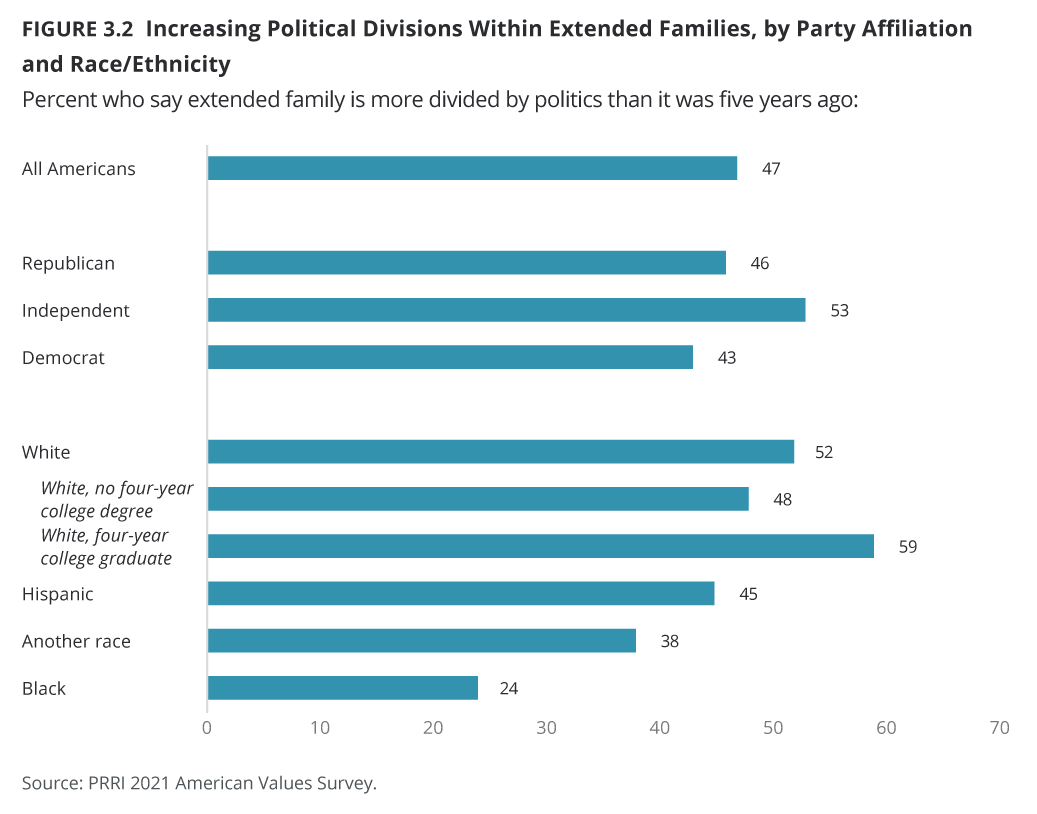
Divisions over politics increase with greater levels of education. Slim majorities of Americans with postgraduate degrees (53%), four-year college degrees (53%), and some college education (48%) are more likely than those with high school degrees or less (40%) to say that their families are more divided over politics than they were five years ago. White Americans with college degrees (59%) are more likely than those with no college degrees (48%) to say their families have become more divided.
About one in five (22%) say that their extended family relationships have been strained to the breaking point over the issue of getting vaccinated against COVID-19. Family tensions over vaccination appear to be more of a problem among Americans who have not yet been vaccinated. Three in ten Americans who have not gotten vaccinated yet (29%), compared to two in ten who have gotten vaccinated (19%), say their relationships have been strained to the breaking point over vaccination.
Extremism, Conspiracies, and QAnon
The Big Lie Maintains Its Hold on Republicans
Around three in ten Americans (31%) say that the 2020 presidential election was stolen from Donald Trump. This share has remained steady throughout 2021, in August (29%), June (30%), and March (29%).
More than two-thirds of Republicans (68%), compared to 26% of independents and 6% of Democrats, believe that the election was stolen from Trump. These shares are even greater among Republicans who most trust Fox News (82%) and essentially universal among those who most trust far-right news (97%). Less than half of Republicans who most trust mainstream news agree (44%).
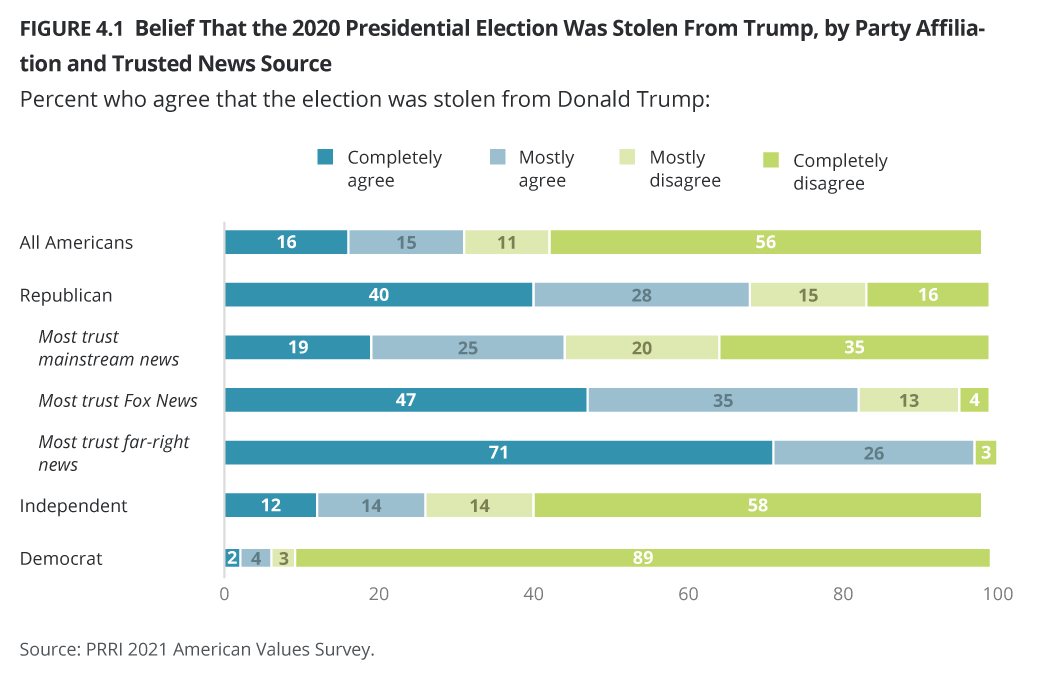
A majority of white evangelical Protestants (60%) and around four in ten white Catholics (40%) and white mainline (non-evangelical) Protestants (37%) believe that the election was stolen from Trump. Smaller shares of other Christians (29%), Hispanic Catholics (19%), Black Protestants (18%), and religiously unaffiliated Americans (17%) agree.
White Americans (36%) are most likely to believe the 2020 election was stolen from Trump, while Hispanic Americans (22%) are slightly more likely than Americans of other races (18%) and Black Americans (16%) to agree.
Americans with high school degrees or less (38%) or some college experience but no four-year degree (32%) are somewhat more likely than those with four-year degrees (24%) or postgraduate degrees (14%) to say that the election was stolen from Trump.
QAnon Beliefs Hold Steady
Around one in five Americans agree with these three core tenets of the QAnon movement:
- “There is a storm coming soon that will sweep away the elites in power and restore the rightful leaders” (21%).
- “The government, media, and financial worlds in the U.S. are controlled by a group of Satan-worshipping pedophiles who run a global child sex-trafficking operation” (18%).
- “Because things have gotten so far off track, true American patriots may have to resort to violence in order to save our country” (18%).
Responses to these questions were combined into an additive QAnon belief scale, which was then recoded into three groups: (1) QAnon believers, or respondents who completely or mostly agreed with these statements (17%); (2) QAnon doubters, or respondents who mostly disagreed with these statements (49%); and (3) QAnon rejecters, or respondents who completely disagreed with all three statements (34%).
These shares are relatively stable compared to June, when 16% of Americans were QAnon believers, 49% were doubters, and 35% were rejecters. The share of rejecters is slightly lower now than it was in March (40%).
One in four Republicans (26%) are QAnon believers, a proportion significantly higher than that of independents (15%) and Democrats (10%). A majority of Republicans (57%), compared to half of independents (50%) and four in ten Democrats (41%), are QAnon doubters. Notably, Democrats are 2.5 times more likely than Republicans to be QAnon rejecters (49% vs. 16%), while independents fall in between (35%). These shares are mostly unchanged since June.
Unsurprisingly, Republicans who most trust Fox News (30%) or far-right news outlets (44%) are more likely than those who most trust mainstream news (16%) to be QAnon believers. Just 8% of Republicans who trust Fox News and 12% of Republicans who trust far-right news, compared to 28% of Republicans who trust mainstream news, are QAnon rejecters.
White evangelical Protestants are most likely to be QAnon believers (23%), followed closely by non-Christian religious Americans (21%) and other Christians (19%). Less than one in five members of other religious groups are QAnon believers, including 18% of Hispanic Catholics, 16% of Black Protestants, 15% of white Catholics, 13% of white mainline (non-evangelical) Protestants, and 12% of religiously unaffiliated Americans.
White Americans without college degrees (20%) and Hispanic Americans (24%) are most likely to be QAnon believers, followed by Americans of other races (18%), Black Americans (17%), and white Americans (15%). Less than one in ten white Americans with four-year college degrees (6%) or postgraduate degrees (3%) are QAnon believers
Who Thinks Political Violence Is Justified?
After the violent attacks on the U.S. Capitol on January 6, 2021, the prospect of political violence threatening a peaceful transfer of power has become more than an abstract question. As noted above, nearly one in five Americans (18%) agree with the statement “Because things have gotten so far off track, true American patriots may have to resort to violence in order to save our country.” Republicans (30%) are more likely to agree with this than independents (17%) and Democrats (11%). Among Republicans who most trust far-right news sources, agreement increases to 40%, compared to 32% among those who most trust Fox News and 22% among those who most trust mainstream news sources.
White evangelical Protestants (26%) are the religious group most likely to agree that true American patriots might have to resort to violence in order to save our country, while 23% of those who follow non-Christian religions, 22% of Hispanic Catholics, 19% of white Catholics, 19% of other Christians, 17% of white mainline (non-evangelical) Protestants, 16% of Black Protestants, and 13% of religiously unaffiliated Americans agree.
The belief that violence could be an option is stronger among those who support former President Donald Trump and view changing culture as a threat. Among those who think the 2020 election was stolen from Trump, 39% agree that true American patriots might have to resort to violence in order to save our country, compared to only 10% among those who do not think the election was stolen.
Those who agree that things have changed so much they feel like strangers in their own country (29%) are more likely than those who disagree (12%) to agree that violence might be necessary, and those who think American culture has mostly changed for the worse since the 1950s (23%) are more likely than those who think it has changed for the better (14%) to say so.
Christian nationalist sympathies matter, as well: Among those who believe God has granted America a special role in human history, 27% agree that violence might be necessary, compared to 12% among those who do not think God granted America a special role.
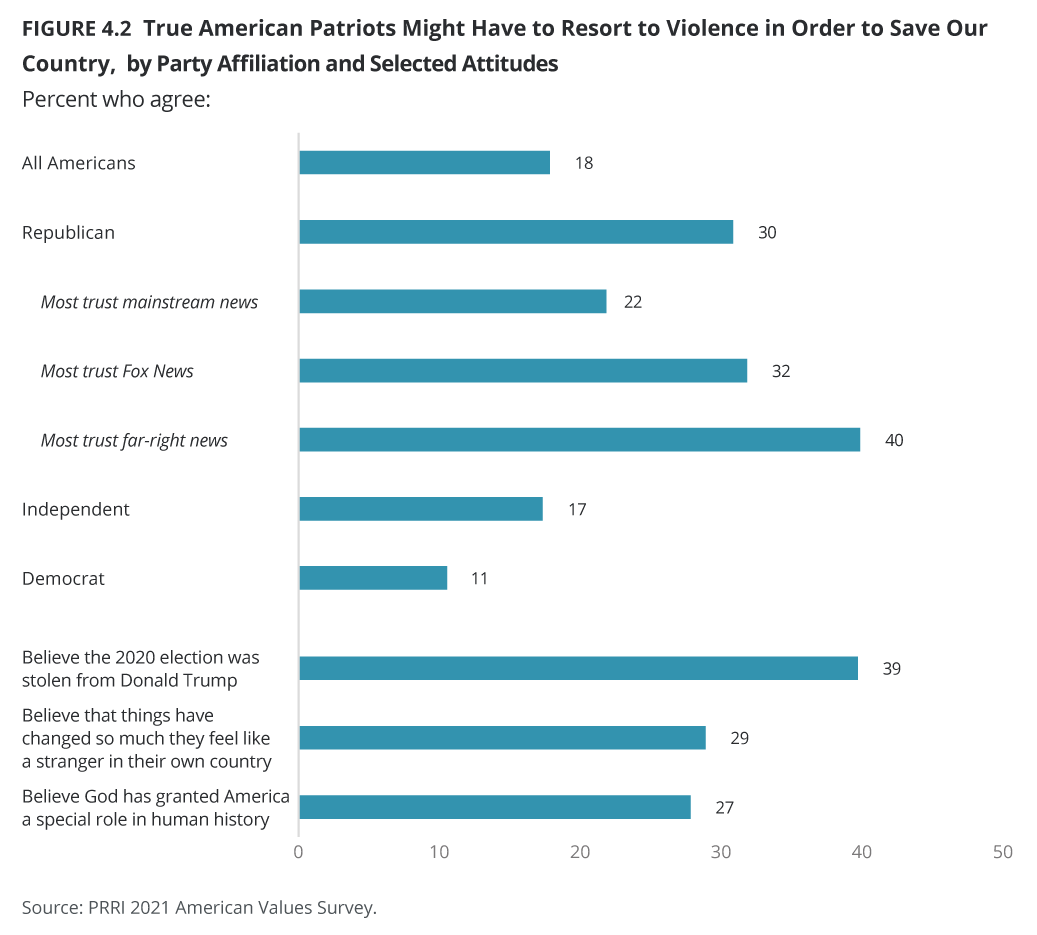
Americans’ Views of Government and Institutions
Joe Biden’s Performance As President
Biden’s Job Approval and Handling of the Economy
Generally, the public is divided on how Joe Biden is doing as president (52% approve, 48% disapprove). Americans are similarly divided in their opinions of Biden’s handling of the economy (50% approve, 49% disapprove). Just one in ten Republicans approve (10%), compared to half of independents (51%) and nine in ten Democrats (87%).
Biden’s COVID-19 Pandemic Response
Biden scores modestly better on his handling of the COVID-19 pandemic (56% approve, 42% disapprove). Just 16% of Republicans approve of Biden’s handling of the pandemic, compared to 59% of independents and 90% of Democrats.
There is a strong correlation between Americans’ vaccination status and their approval of Biden’s handling of the pandemic. Among the unvaccinated, just one in three (29%) approve of Biden’s handling of COVID-19, whereas among the vaccinated, two in three (67%) approve.
Biden’s Decision to Withdraw From Afghanistan
A majority of Americans (54%) approve of Biden’s decision to withdraw troops from Afghanistan. Less than one in five Republicans (16%) approve of Biden’s decision. Independents are far more supportive, with 56% saying they approve of the decision. More than eight in ten Democrats (83%) approve of Biden’s decision to withdraw troops from Afghanistan.
Biden’s Handling of Immigration
Four in ten Americans (41%) approve of how Biden is handling immigration. Nearly six in ten (58%) disapprove. Less than one in ten Republicans (7%) approve of Biden’s handling of immigration, compared to four in ten independents (37%) and three-quarters of Democrats (73%). Just 2% of Republicans who most trust Fox News and no Republicans who trust far-right news sources approve of Biden’s handling of immigration. All Republicans who trust far-right news sources (100%) report disapproving of Biden’s handling of immigration.[1]
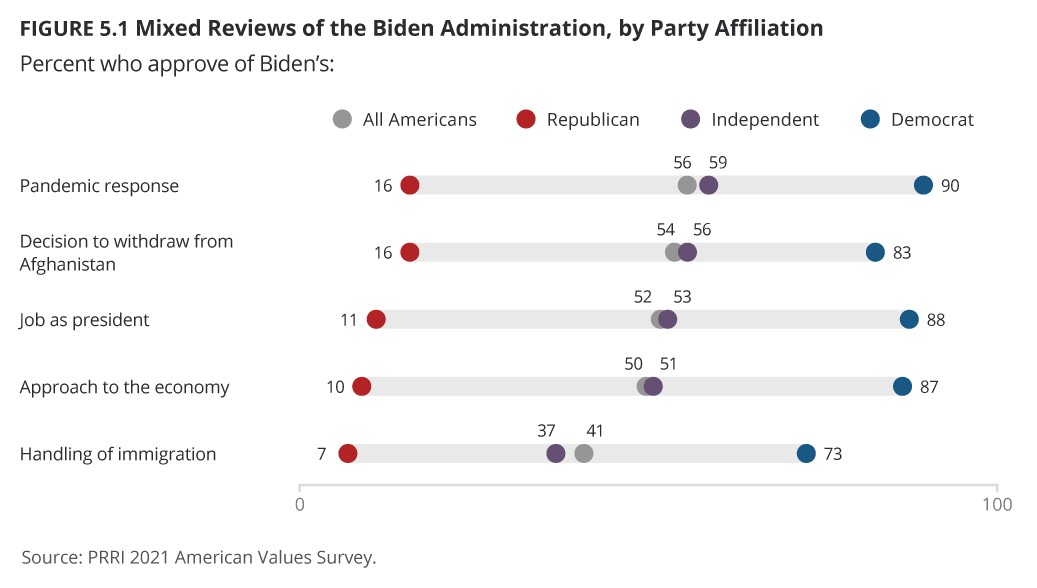
Biden and Harris Favorability Compared to Previous Leaders
Biden Favorability
A slim majority of Americans (52%) view President Biden favorably, and 46% view him unfavorably. One in ten Republicans (10%) view President Biden favorably. About half of independents (52%) and nine in ten Democrats (90%) view Biden favorably. Republicans who trust mainstream TV news sources are more than twice as likely to view Biden favorably (24%) than Republicans in general are.
Harris Favorability
Less than half of Americans (45%) view Vice President Kamala Harris favorably. About half (49%) view the vice president unfavorably, and 4% say they have not heard of her. Less than one in ten Republicans (9%) view Vice President Harris favorably. Four in ten independents (42%) and eight in ten Democrats (83%) hold favorable views of the vice president.
About seven in ten Black Americans (69%) view Harris favorably. A small majority of Hispanic Americans (55%) hold favorable views of Harris. About half of Americans of another race (51%) and multiracial Americans (48%) view the vice president favorably. One in four white Americans (39%) hold favorable views of Harris.
Biden Favorability Compared to Past Presidents
Former President Donald Trump is currently viewed less favorably than Biden and prior presidents, with 36% of Americans viewing Trump favorably and 62% unfavorably. Former President George W. Bush holds the same favorability as Biden, 52%. Six in ten Americans view former President Barack Obama favorably (61%).
Eight in ten Republicans view Trump favorably (80%), compared to 74% of Republicans who view George W. Bush favorably, a small but statistically significant difference. Democrats’ views on Trump and Bush are sharply divergent; just 8% currently hold a favorable view of Trump, compared to 42% who view Bush favorably.
Republicans are twice as likely to view Barack Obama favorably (22%) as they are to view Joe Biden favorably (10%). Democrats are somewhat more likely to view Barack Obama favorably than Joe Biden (94% vs. 90%).
Elections, Voting, and Fraud
Majority More Concerned About Voter Suppression Than Fraud
When asked to choose the bigger of two problems, “people casting votes who are not eligible” or “eligible voters being denied the right to vote,” a majority (55%) say they are more worried about eligible voters being denied their right to vote, and 42% say the bigger problem is ineligible people casting votes.
Partisanship is strongly correlated with Americans’ perceptions of which problem is bigger in elections. Eight in ten Republicans (83%), compared to just 12% of Democrats, say the bigger problem is people casting ballots who aren’t eligible. Only 16% of Republicans say the bigger problem is eligible voters being denied the right to vote, compared to 87% of Democrats. Four in ten independents (41%) say the bigger problem is people casting votes who are not eligible, with six in ten (57%) saying the bigger issue is eligible voters being denied the right to vote.
Large majorities of Republicans who trust far-right media and Fox News say people casting votes without being eligible is a bigger problem than eligible voters being denied the right to vote (99% and 89%, respectively). Seven in ten Republicans who trust mainstream TV news sources (70%) hold the same view.
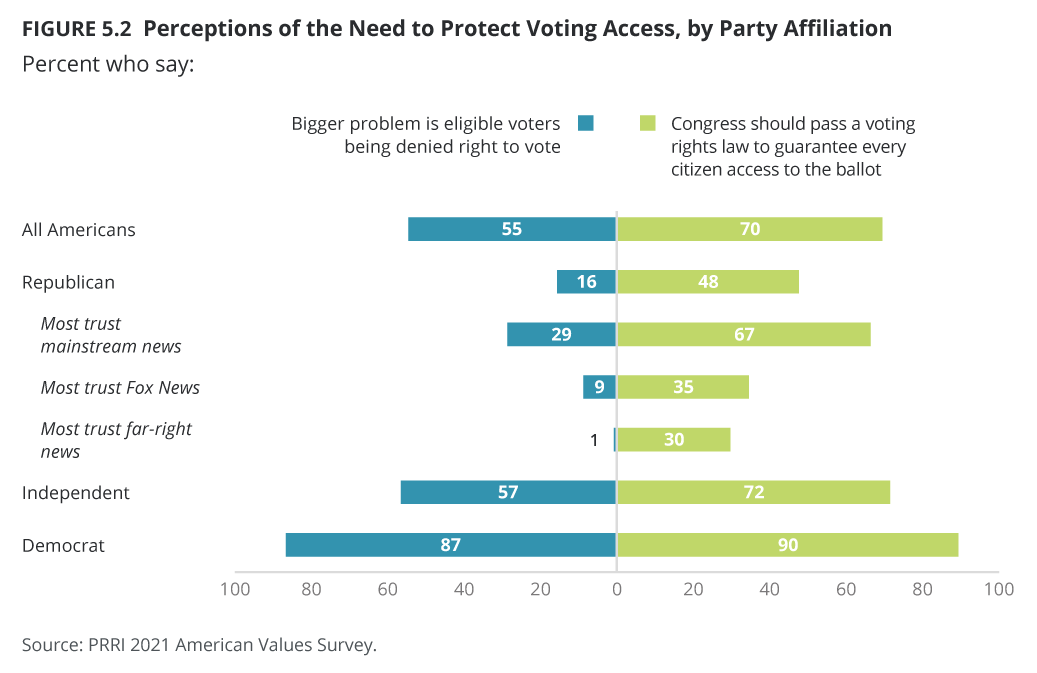
Widespread Support for Federal Voting Rights Action
When faced with the choice between whether Congress should pass a voting rights law to guarantee every citizen access to the ballot or whether voting rights decisions should be left to the states, seven in ten Americans (70%) say Congress should pass a voting rights law. Three in ten (27%) say that voting rights should be left to the states.
About half of Republicans (48%), seven in ten independents (72%), and nine in ten Democrats (90%) think Congress should pass voting rights legislation. Only about one-third of Republicans who most trust Fox News (35%) or far-right media (30%) say Congress should pass a voting rights law rather than leave voting to the states. By contrast, two-thirds (67%) of Republicans who trust mainstream news favor federal voting rights protections.
Across racial and ethnic groups, majorities of Americans support Congress passing a voting rights law. Nearly two-thirds of white Americans (65%), seven in ten Hispanic Americans (73%), three-quarters of multiracial Americans (75%), eight in ten Americans of another race (80%), and nearly nine in ten Black Americans (88%) support federal voting rights legislation.
Americans Say They Want Politicians to Compromise
Americans are relatively united in the opinion that politicians should compromise to find solutions. Three-quarters of Americans (74%) prefer compromise in the interest of solutions. Just one in five (23%) say politicians should stick to their principles even if it means nothing gets done. Two-thirds of Republicans (65%) and eight in ten independents (78%) and Democrats (83%) say they favor compromise.
2022 Congressional Election
Americans are divided on whether they would vote for a Democratic or Republican congressional candidate if the 2022 congressional election were being held today. About four in ten (37%) say that they would choose the Democratic candidate, three in ten say they would choose the Republican candidate (29%), 5% say they would vote for someone else or a third-party candidate, 23% say they don’t know who they would vote for, and 5% say they wouldn’t vote. Among those who say they would vote for someone else, a third party, or did not know, half of Americans (50%) say they would vote for a Democratic candidate and four in ten (39%) say they would vote for a Republican candidate when pushed to choose a side.
Predictably, most Republicans (83%) say they would vote for a Republican candidate, and most Democrats (81%) say they would vote for a Democratic candidate. Independents are more divided: One in four (26%) say they would vote for a Democrat, while one in five (20%) say they would vote for a Republican. One in ten independents say they would vote for someone else or a third-party candidate (11%). A third of independents say they don’t know which candidate they would vote for (36%), compared to 13% of Republicans and 14% of Democrats.
Perceptions of the Two Political Parties
The Republican Party: Racist, or Protecting America?
When asked to choose which statement comes closer to their views: “The Republican Party is trying to protect the American way of life against outside threats” or “The Republican Party has been taken over by racists,” Americans are divided. For the first time since PRRI has polled the question, more than half of Americans—51%, including 55% of independents—say the Republican Party has been taken over by racists, compared to 45% who say it is trying to protect America from outside threats. In 2019 and 2020, 48% and 49%, respectively, said the Republican Party had been taken over by racists, and 50% of Americans said the Republican Party was trying to protect the American way of life.
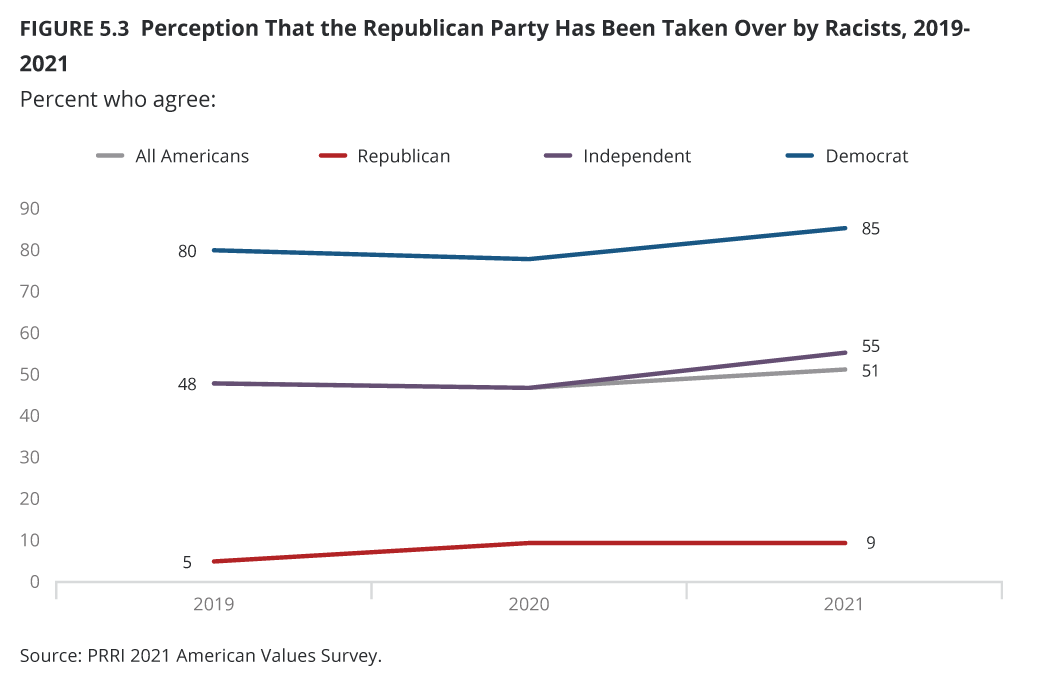
Unsurprisingly, few Republicans say their own party has been taken over by racists. One in ten (9%) say their party has been taken over by racists, a number that has remained consistent after rising from 5% in 2019 to 9% in 2020. A majority of independents (55%) and more than eight in ten Democrats (85%) say the Republican Party has been taken over by racists—both increases from 2020 (47% and 78%, respectively).
Just one in five white evangelicals say the Republican Party has been taken over by racists (19%). A third of white Catholics (36%), four in ten white mainline Protestants (42%) and Hispanic Protestants (42%), and just under half of other Christians (46%) hold the same view. By contrast, majorities of Americans who follow non-Christian religions (62%), Hispanic Catholics (66%), religiously unaffiliated Americans (72%), and Black Protestants (75%) say the Republican Party has been taken over by racists.
White Americans are the only racial or ethnic group among whom a minority (43%) say the Republican Party has been taken over by racists, although there is an educational divide: 36% of white Americans without four-year college degrees say this, compared to a majority (56%) of those with four-year college degrees or higher educational attainment. Half of multiracial Americans (50%) say the Republican Party has been taken over by racists. Majorities of Hispanic Americans (62%), Americans of another race (68%), and Black Americans (73%) say the Republican Party has been taken over by racists.
The Democratic Party: Socialist, or Trying to Make Capitalism Work for Everyone?
Americans are divided on whether the Democratic Party is trying to make capitalism work for average Americans or whether it has been taken over by socialists. A slim majority (51%) say it is trying to make capitalism work, and 44% say instead that it has been taken over by socialists. These numbers have changed relatively little since 2019 and 2020, when 53% and 52%, respectively, said the Democratic Party was trying to make capitalism work and 44% and 45%, respectively, said it had been taken over by socialists.
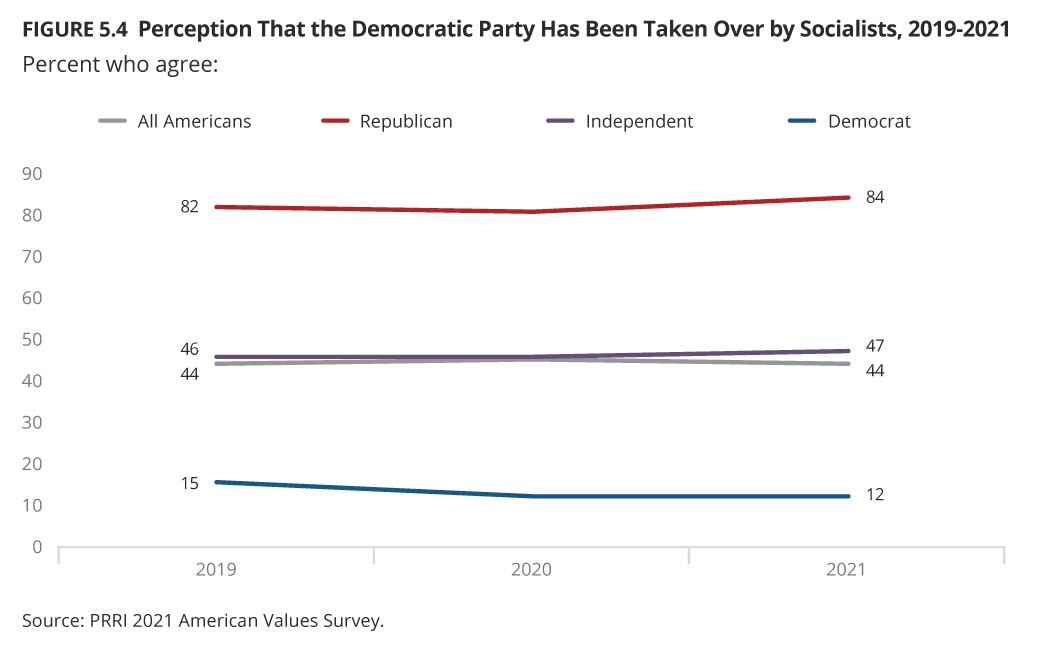
A majority of Republicans (84%) say the Democratic Party has been taken over by socialists. Slightly less than half of independents (47%) and about one in ten Democrats (12%) say the Democratic Party has been taken over by socialists.
Trust in Institutions and People in Government
Federal, State, and Local Governments
Americans are somewhat united in a sense of distrust of the federal government. Seven in ten (71%) say they rarely or never trust the federal government, compared to three in ten (29%) who say that they trust the federal government just about always or most of the time.
Less than half of Americans across partisan groups say they can trust the federal government, but Democrats are more than three times as likely as Republicans to say they mostly trust the federal government (46% vs. 14%). Independents (26%) mirror the general public.
State Governments
A majority of Americans (61%) say they rarely or never trust their state governments. Four in ten (38%) say they trust their state governments just about always or most of the time, including 4% of Americans who say they can just about always trust their state governments. One in three Republicans (34%) and independents (34%) say they can trust their state governments. Just under half of Democrats (49%) trust their state governments.
Local Governments
A majority of Americans (56%) say they rarely or never trust their local governments. The percentage of Americans who trust their local governments just about always or most of the time (43%) is higher than the percentage of those who trust their state governments (38%) and the federal government (29%).
A majority of Democrats (53%) mostly trust their local governments. Independents and Republicans track closely with each other in their trust of local governments, at 39% and 41%, respectively.
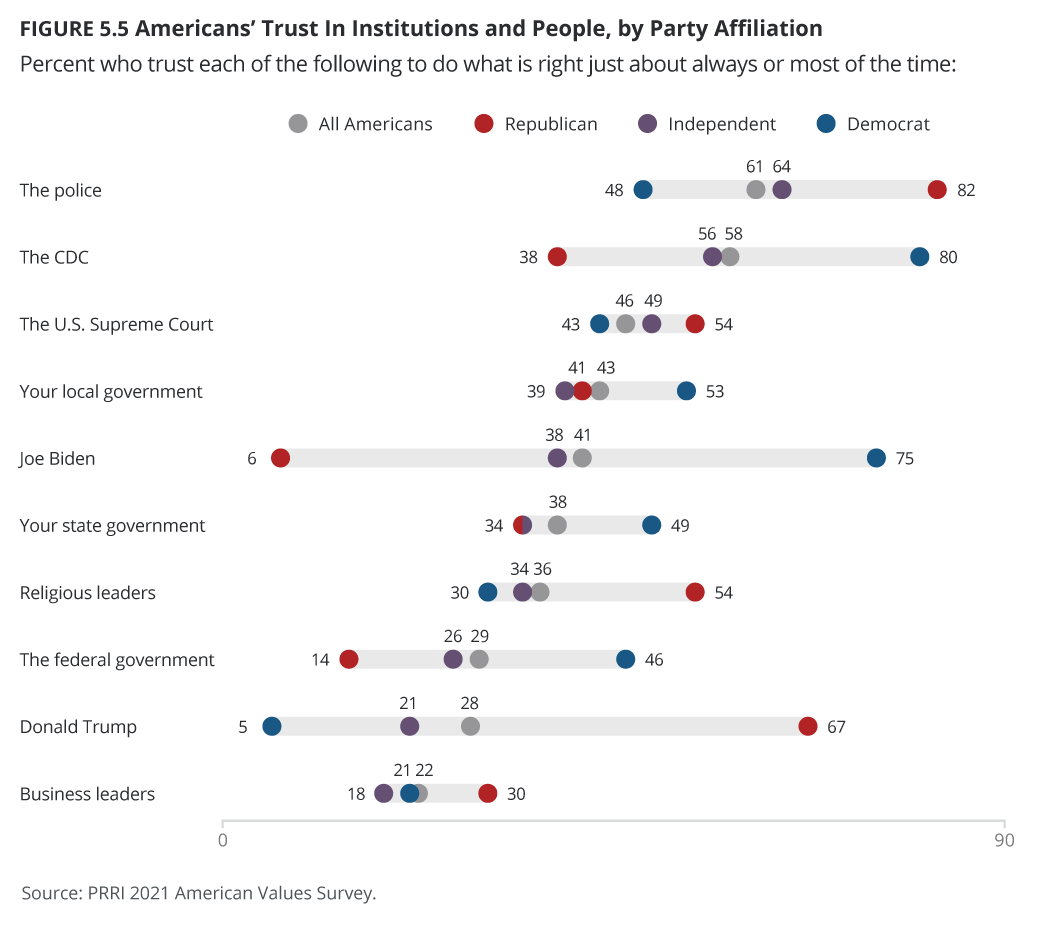
The Police
Six in ten Americans (61%) say they mostly trust the police, with the other four in ten (38%) saying they mostly do not trust the police. Eight in ten Republicans (82%) mostly trust the police, compared to 64% of independents and 48% of Democrats.
Seven in ten white Americans (72%), six in ten multiracial Americans (57%), and just over half of Hispanic Americans (51%) mostly trust the police. About four in ten Americans of another race (43%) and only three in ten Black Americans (29%) trust the police. White Americans without four-year college degrees (74%) are more likely than those with four-year college degrees (68%) to trust the police.
The Supreme Court
Less than half (46%) of Americans mostly trust the U.S. Supreme Court. A small majority of Republicans (54%) trust the U.S. Supreme Court. Fewer than half of independents (49%) and Democrats (43%) trust the Supreme Court.
Majorities of Hispanic Catholics (60%), non-Christian religious Americans (55%), white Catholics (53%), white mainline (non-evangelical) Protestants (56%), and white evangelicals (51%) trust the Supreme Court. Other Christians (40%), Black Protestants (39%), and religiously unaffiliated Americans (34%) say they mostly trust the Supreme Court.
Donald Trump
Less than three in ten Americans (28%) say they mostly trust Donald Trump. Two-thirds of Republicans (67%) trust Donald Trump. One in five independents (21%) and just 5% of Democrats trust Donald Trump. Republicans who trust far-right media sources most (88%) and those who trust Fox News most (87%) are much more likely to mostly trust Trump than those who trust mainstream news sources (43%).
Six in ten white evangelical Protestants (58%) trust Donald Trump, making them the only religious group of whom a majority trust Donald Trump. About four in ten white mainline (non-evangelical) Protestants (39%) and white Catholics (38%) mostly trust Trump, while fewer other Christians (22%), non-Christian religious Americans (19%), Hispanic Catholics (15%), religiously unaffiliated Americans (14%), and Black Protestants (8%) say the same.
Joe Biden
Four in ten Americans (41%) say they mostly trust Joe Biden. Less than one in ten Republicans (6%), about one in four independents (38%), and three-quarters of Democrats (75%) trust Joe Biden.
Majorities of Black Protestants (62%) and Hispanic Catholics (58%) trust Joe Biden. About half of non-Christian religious Americans (50%) and religiously unaffiliated Americans (49%) trust Joe Biden. More than one-third of white mainline (non-evangelical) Protestants (38%), other Christians (37%), and white Catholics (35%) say they mostly trust Biden, but only 11% of white evangelical Protestants say the same.
Majorities of Black Americans (57%) and Hispanic Americans (51%) trust Joe Biden, while fewer Americans of other races (46%) and white Americans (35%) say they mostly trust the current president. White Americans with four-year college degrees (49%) are much more likely than those without college degrees (27%) to mostly trust Biden.
The CDC
A majority of all Americans (58%) mostly trust the Centers for Disease Control and Prevention (CDC). One in four Republicans (38%), over half of independents (56%), and eight in ten Democrats (80%) trust the CDC.
Across racial and ethnic groups, majorities of Americans trust the CDC. Majorities of Americans of another race (68%), Hispanic Americans (58%), Black Americans (55%), white Americans (57%), and multiracial Americans (51%) trust the CDC.
Americans who have been vaccinated against COVID-19 are more than twice as likely to say that they trust the CDC (69%) as those who have not been vaccinated (30%).
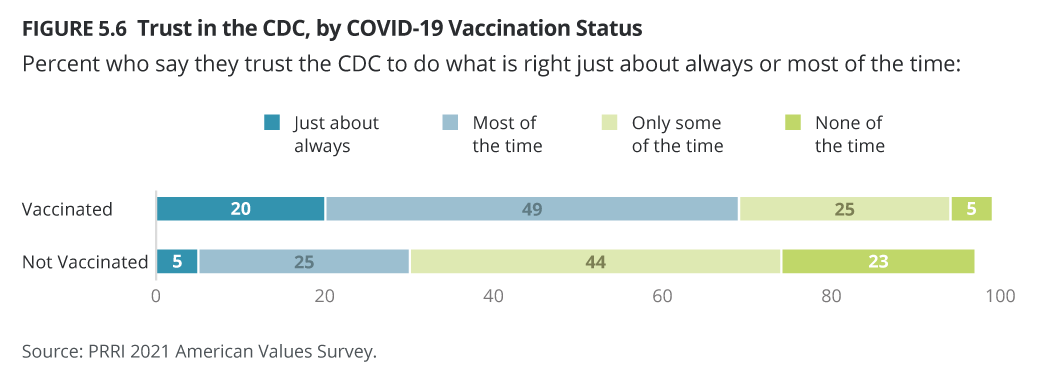
Business Leaders
Just one in five Americans (22%) say they mostly trust business leaders. Three in ten Republicans (30%) trust business leaders. One in five independents and Democrats trust business leaders (18% and 21%, respectively).
Religious Leaders
About one-third of Americans (36%) mostly trust religious leaders. A majority of Republicans (54%) trust religious leaders. One-third of independents (34%) and three in ten Democrats (30%) trust religious leaders.
White evangelicals are the only major religious group among whom a majority (64%) trust religious leaders just about always or most of the time. Among Americans who attend religious services at least once a week, trust in religious leaders is higher. Three-quarters of white evangelicals (74%), 73% of white Catholics, 67% of Black Protestants, 64% of other Christians, 62% of Hispanic Protestants, 58% of white mainline (non-evangelical) Protestants, 51% of Hispanic Catholics, 51% of non-Christian religious Americans, and 41% of followers of non-Christian religions who attend services at least weekly say they trust religious leaders.
Issues Facing the Nation
Critical Issues by Party and Religious Affiliation
Critical Issues Trends, 2020–2021
On a list of 15 issues facing the nation, the only one a majority of Americans agree is a critical issue right now is the coronavirus pandemic (54%). Nearly half (49%) say health care is a critical issue. These were the top two issues in the set PRRI asked about in 2020; however, more Americans rated both as critical last year (60% and 56%, respectively). Last year, a majority of Americans (54%) also thought jobs and unemployment was a critical issue, but this year, that has declined to 41%.
Four in ten or more Americans also think terrorism (47%), the increasing costs of housing and everyday expenses (45%), immigration (44%), climate change (44%), crime (43%), and the growing gap between the rich and the poor (40%) are critical issues. Compared to 2020, none of these proportions has changed substantially.[13]
Less than four in ten Americans (37%) say racial inequality is a critical issue, a decline from 46% in 2020. One-third or more say the federal deficit (36%), infrastructure like bridges and the electrical grid (35%), and abortion (33%) are critical issues, similar to the numbers recorded in 2020.[14] The appointment of U.S. Supreme Court justices (29%) and ending the war in Afghanistan (25%) have the smallest proportions of Americans rating them as critical of the issues on the list. Appointment of U.S. Supreme Court justices was deemed critical by 40% of Americans in 2020.
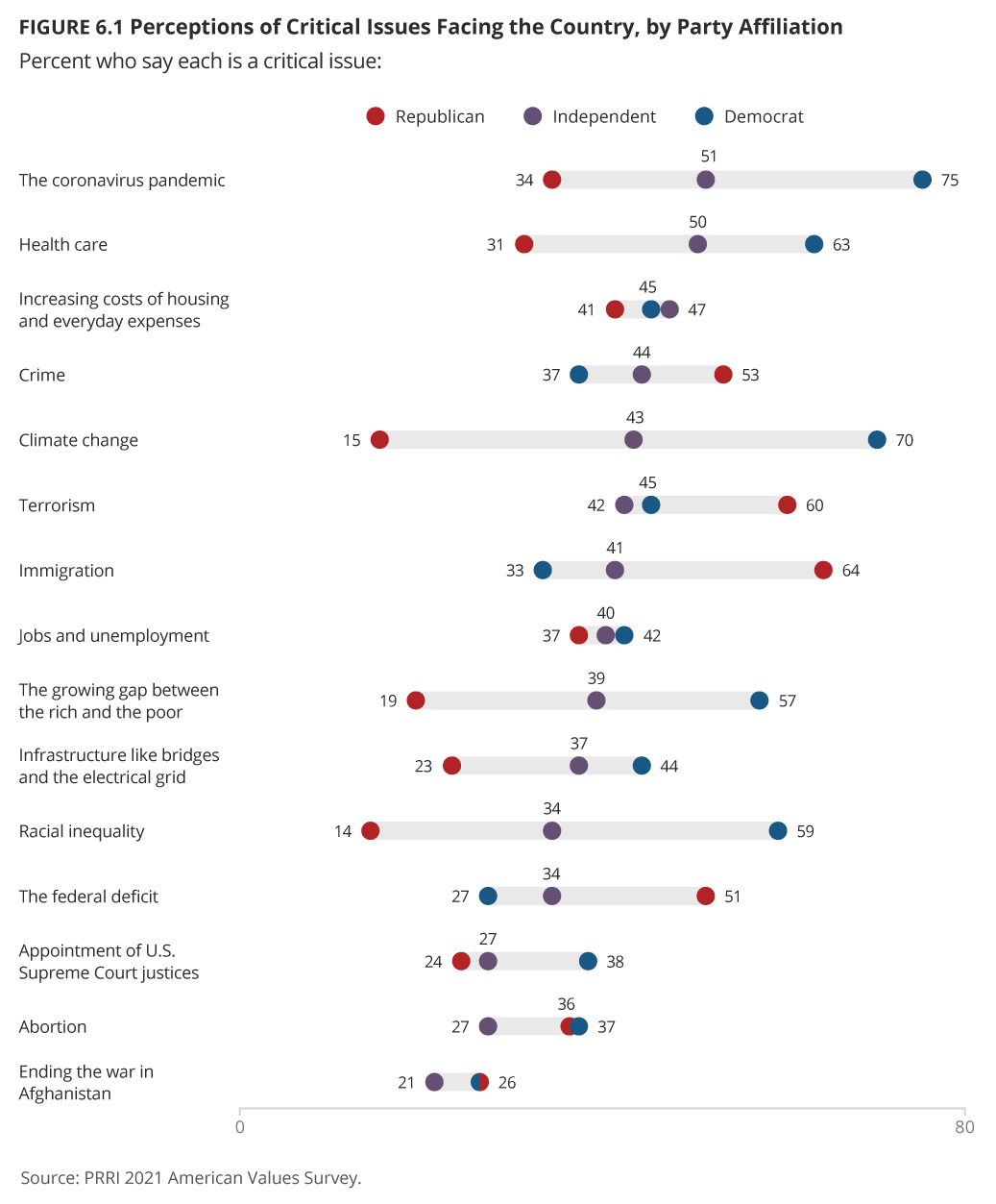
Critical Issues by Party Affiliation
The issues deemed most critical vary considerably by partisanship. In fact, there is no overlap in the issues majorities of partisans say are critical, but two issues are shared as majority concerns by independents and Democrats. Majorities of Republicans say that immigration (64%), terrorism (60%), crime (53%), and the federal deficit (51%) are critical issues. Majorities of Democrats say that the coronavirus pandemic (75%), climate change (70%), health care (63%), racial inequality (59%), and the growing gap between the rich and the poor (57%) are critical. The coronavirus pandemic (51%), health care (50%), and the increasing costs of housing and everyday expenses (47%) are the top critical issues among independents.
Critical Issues by Religious Affiliation
Majorities of white Christian groups rate a very different set of issues as critical compared to Christians of color, non-Christian religious Americans, and religiously unaffiliated Americans.[15] The top issues for white evangelical protestants are terrorism (57%), immigration (54%), and the federal deficit (50%). Majorities of white mainline (non-evangelical) Protestants say immigration (53%) and terrorism (51%) are critical issues. And similarly, majorities of white Catholics say immigration (57%), terrorism (55%), and health care (52%) are critical issues.
Black Protestants are generally more likely to say most issues are critical issues. Substantial majorities say the coronavirus pandemic (77%), racial inequality (68%), and crime (59%) are critical issues. Majorities of Hispanic Catholics also rate several issues as critical, including the coronavirus pandemic (69%), terrorism (66%), and crime (62%).
Other Christians are most likely to say health care (55%) and the coronavirus pandemic (51%) are critical. Majorities of non-Christian religious Americans say the coronavirus pandemic (60%), the growing gap between the rich and the poor (54%), and climate change (54%) are critical issues. Similarly, majorities of religiously unaffiliated Americans say the coronavirus pandemic (60%), climate change (60%), and health care (58%) are critical issues.
Ending the War in Afghanistan
Engagement With and Withdrawal From Afghanistan
Now that the nearly 20-year war in Afghanistan has ended and U.S. troops have been withdrawn, a majority of Americans (52%) mostly or strongly agree that the U.S. should never have sent troops to Afghanistan in the first place, while 45% mostly or strongly disagree. Republicans (31%) are significantly less likely than independents (56%) and Democrats (67%) to agree that the war should not have been started in the first place. Two-thirds of Republicans (69%) disagree. Unlike many other issues, media trust does not make a substantial difference in Republicans’ views.
As for the handling of the troop withdrawal itself, 43% of Americans mostly or completely agree that the recent withdrawal of U.S. troops from Afghanistan was handled as well as possible under the circumstances. A majority (56%) disagree, including 34% who completely disagree. One in ten Republicans (11%), compared to 45% of independents and 69% of Democrats, agree that the withdrawal was handled as well as possible.
Did the Wars in or Withdrawal From Afghanistan Make Americans Safer?
Americans’ views are mixed on whether engaging in wars in Iraq and Afghanistan following the 9/11 terrorist attacks has made Americans safer (37%), less safe (31%), or made no difference (29%). Republicans (59%) are much more likely to say these actions have made Americans safer than independents (35%) or Democrats (27%). A plurality of Democrats (40%) say these actions have made Americans less safe, with 31% saying the wars made no difference. Independents are evenly divided, with 32% saying Americans are less safe and 32% saying there is no difference.
Nearly half of Americans (46%) say that ending the war and withdrawing troops from Afghanistan has made the country less safe from terrorism, compared to 18% who say it makes Americans safer and 34% who say it makes no difference. Partisan differences are substantial: 76% of Republicans say the withdrawal makes Americans less safe from terrorism, as do 45% of independents but only 26% of Democrats. A plurality of Democrats (45%) say the withdrawal makes no difference.
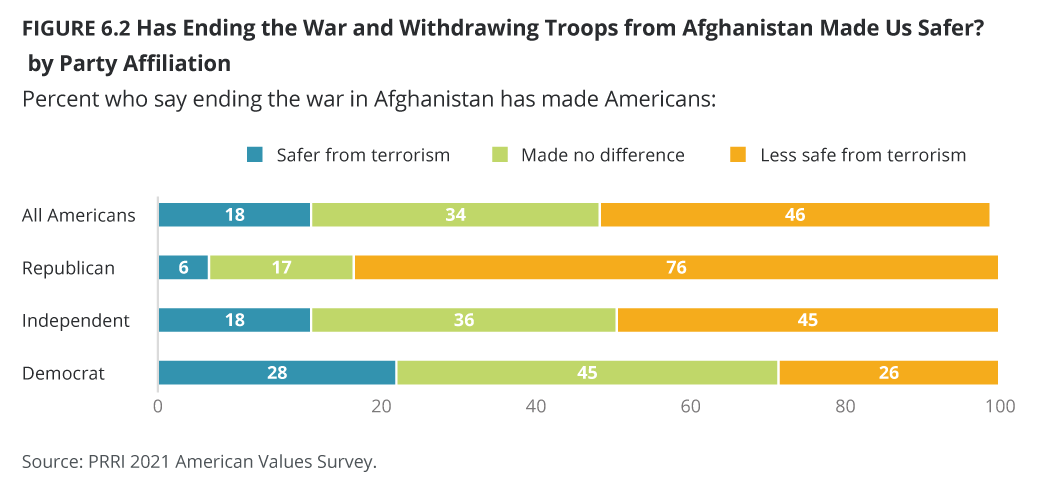
Americans Support Afghan Refugees
Notably, Americans are more supportive of allowing refugees from Afghanistan than refugees from an unspecified location. Six in ten Americans (59%) oppose a law that would prevent refugees from entering the U.S. when their origins are not specified. Two-thirds of Americans (66%) oppose or strongly oppose passing a law that would prevent refugees from Afghanistan from entering the U.S. About half of Republicans (50%) oppose preventing Afghan refugees from entering the country, but far more independents (73%) and Democrats (77%) oppose that restriction. Opposition to such a restriction on refugees declines for Republicans (34%) and independents (64%) when the location is not specified, but Democrats (74%) did not substantially shift their views.
Majorities of every religious group oppose preventing refugees from Afghanistan from entering the country. Non-Christian religious Americans (87%) and religiously unaffiliated Americans (77%) are most opposed, followed by other Christians (68%), white mainline (non-evangelical) Protestants (67%), Hispanic Catholics (65%), Black Protestants (63%), white Catholics (61%), and white evangelical Protestants (57%).[16]
Some religious groups are less supportive of refugees generally than they are of refugees from Afghanistan. Opposition to preventing refugees from entering the U.S. drops to 64% among non-Christian religious, to 53% among white mainline (non-evangelical) Protestants, to 48% among white Catholics, and to 45% among white evangelical Protestants.
Abortion
Despite recent attention to the issue of the legality of abortion, Americans’ opinions about it have remained stable. Six in ten Americans (60%) say abortion should be legal in most or all cases, compared to less than four in ten (38%) who say it should be illegal in most or all cases. Notably, only 11% of Americans say it should be illegal in all cases, compared to 27% who say it should be legal in all cases. Since PRRI began asking the question, in 2010, the proportion of Americans who say abortion should be illegal in most or all cases has never been above 45%, and the proportion who say it should be illegal in all cases has never been above a peak of 19%, in 2014.
Similarly, more than six in ten Americans (63%) completely or mostly agree that Roe v. Wade, the 1973 Supreme Court decision that affirmed a constitutional right to abortion, was the right decision and should be upheld. One-third (33%) mostly or completely disagree, and 4% are not sure. Support for Roe v. Wade is seven points higher now than it was in 2018, when 56% of Americans said Roe v. Wade was the right decision, 33% said it was the wrong decision, and 11% were not sure.
There is notable asymmetric polarization on this issue. Republicans (41%) are half as likely as Democrats (81%) to agree that Roe v. Wade should be upheld, but independents (66%) are significantly closer to Democrats in their views. Six in ten Republicans who most trust mainstream news largely agree that Roe v. Wade was the right decision and should be upheld (61%), far greater than the shares of Republicans who most trust Fox News (34%) or far-right media (23%). There is also a gender divide among Republicans: Republican women (47%) are substantially more likely than Republican men (37%) to say Roe v. Wade should be upheld.
With the exceptions of white evangelical Protestants (30%) and Hispanic Protestants (40%), majorities of every major religious group agree that Roe v. Wade was the right decision and should be upheld. Religiously unaffiliated Americans (82%) are most likely to say the decision should be upheld, as are majorities of non-Christian religious Americans (74%), white mainline (non-evangelical) Protestants (71%), Black Protestants (67%), white Catholics (61%), Hispanic Catholics (56%), and other Christians (56%).
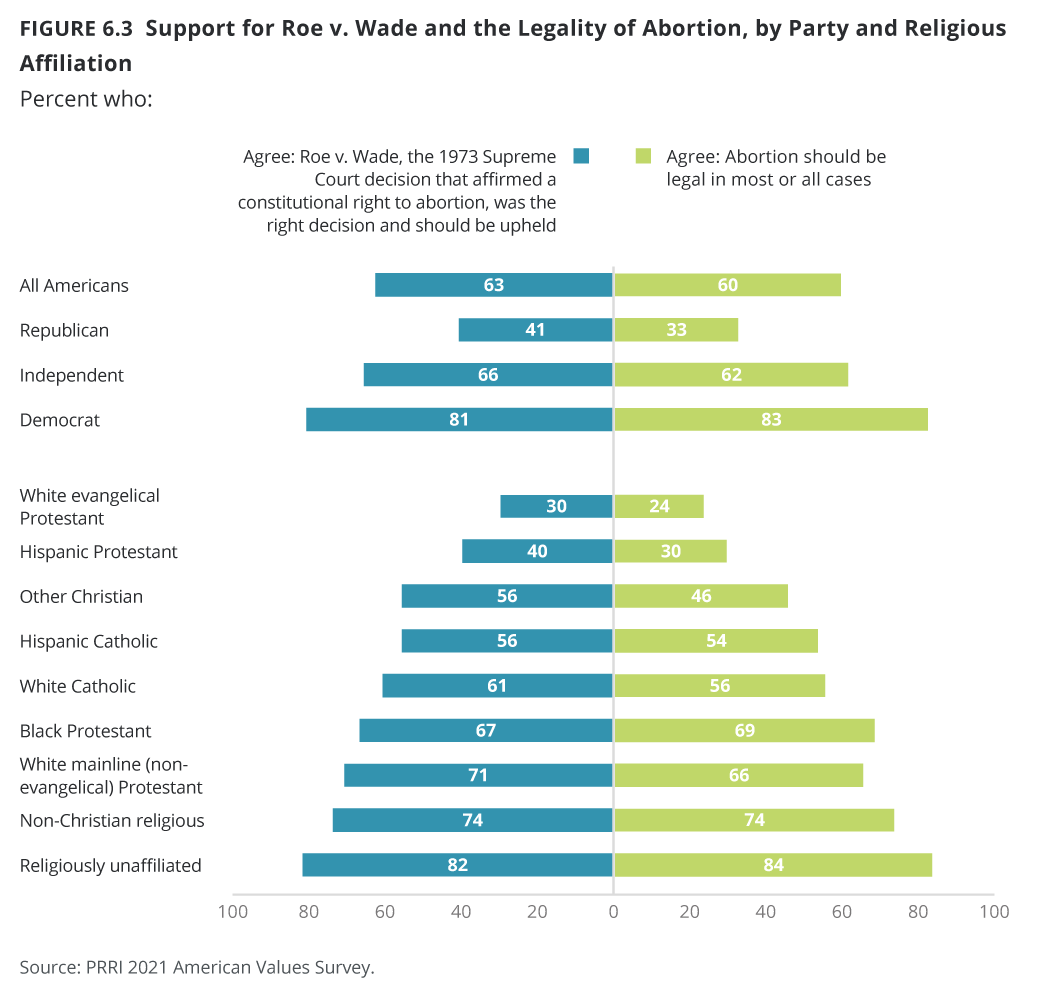
Hispanic Americans (56%) are less likely than white Americans (63%), Black Americans (66%), and Americans of other races (68%) to say Roe v. Wade should be upheld. Americans with college degrees or higher education levels (70%) are more likely than those with less than a four-year college degree (60%) to say Roe v. Wade should be upheld. The educational divide holds within racial groups. Women (65%) are slightly more likely than men (60%) to say Roe v. Wade should be upheld.
Despite ongoing legislative and court disputes involving abortion, only 27% of Americans agree that “In my lifetime, I believe it is likely that no one will be able to get a legal abortion in the U.S.,” compared to 71% who disagree. Republicans (75%) and independents (73%) are equally likely to disagree with this statement, and Democrats (69%) are only slightly less likely to disagree. There are few religious or demographic differences in opinion on this question.
Survey Methodology
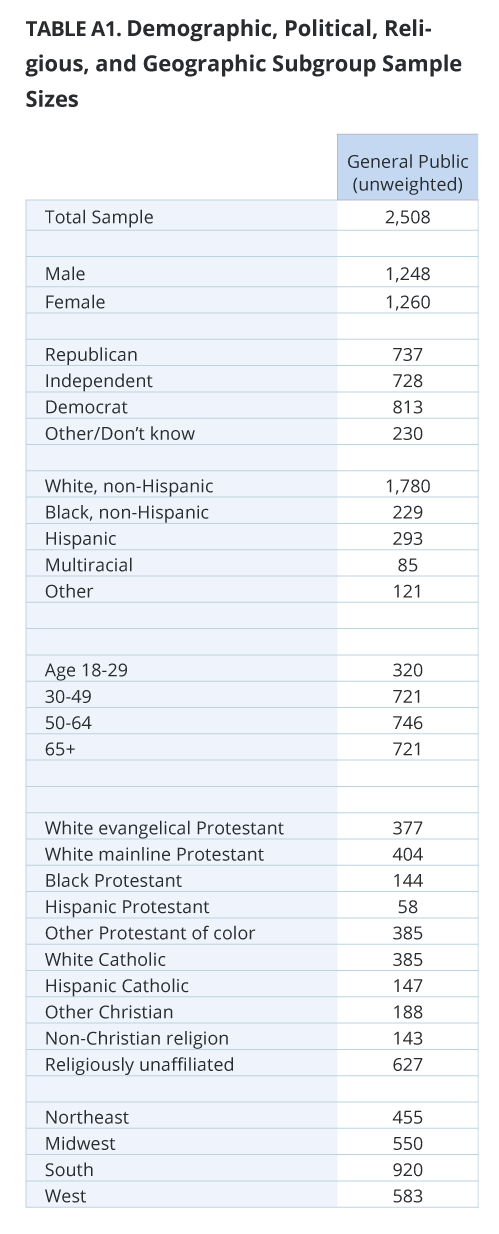 The survey was designed and conducted by PRRI. The survey was made possible through the generous support of the Carnegie Corporation of New York, with additional support from the Wilbur and Hilda Glenn Family Foundation and the Unitarian Universalist Veatch Program at Shelter Rock. Interviews were conducted among a representative sample of 2,508 adults (age 18 and up) living in all 50 states in the United States who are part of Ipsos’s Knowledge Panel. Interviews were conducted online between September 16 and 29, 2021.
The survey was designed and conducted by PRRI. The survey was made possible through the generous support of the Carnegie Corporation of New York, with additional support from the Wilbur and Hilda Glenn Family Foundation and the Unitarian Universalist Veatch Program at Shelter Rock. Interviews were conducted among a representative sample of 2,508 adults (age 18 and up) living in all 50 states in the United States who are part of Ipsos’s Knowledge Panel. Interviews were conducted online between September 16 and 29, 2021.
Respondents are recruited to the KnowledgePanel using an addressed-based sampling methodology from the Delivery Sequence File of the USPS – a database with full coverage of all delivery addresses in the U.S. As such, it covers all households regardless of their phone status, providing a representative online sample. Unlike opt-in panels, households are not permitted to “self-select” into the panel; and are generally limited to how many surveys they can take within a given time period.
The initial sample drawn from the KnowledgePanel was adjusted using pre-stratification weights so that it approximates the adult U.S. population defined by the latest March supplement of the Current Population Survey. Next, a probability proportional to size (PPS) sampling scheme was used to select a representative sample.
To reduce the effects of any non-response bias, a post-stratification adjustment was applied based on demographic distributions from the most recent American Community Survey (ACS). The post-stratification weight rebalanced the sample based on the following benchmarks: age, race and ethnicity, gender, Census division, metro area, education, and income. The sample weighting was accomplished using an iterative proportional fitting (IFP) process that simultaneously balances the distributions of all variables. Weights were trimmed to prevent individual interviews from having too much influence on the final results. In addition to an overall national weight, separate weights were computed for each state to ensure that the demographic characteristics of the sample closely approximate the demographic characteristics of the target populations. The state-level post-stratification weights rebalanced the sample based on the following benchmarks: age, race and ethnicity, gender, education, and income.
The margin of error for the national survey is +/- 2.1 percentage points at the 95% level of confidence, including the design effect for the survey of 1.15. In addition to sampling error, surveys may also be subject to error or bias due to question wording, context, and order effects. Additional details about the KnowledgePanel can be found on the Ipsos website: https://www.ipsos.com/en-us/solution/knowledgepanel
Endnotes
[1]The number of cases for Republicans who trust far-right media outlets the most as their main source of information is 90. Results should be interpreted with caution.
[2]Other Christians includes Jehovah’s Witnesses, Latter-day Saints, Orthodox, Catholics who are not white or Hispanic, and Protestants who are not white, Black, or Hispanic. This includes all Asian and Native American Christians. These groups are combined due to small sample sizes.
[3]The number of cases for all other religious groups in 2013 are too small to report.
[4]Some questions in this section were asked first in 2015 and others in 2018. The belief that “every citizen should be able to vote in elections” was asked for the first time in 2021. Only statistically significant changes over time are reported.
[5]Respondents were asked to put themselves on a ten-point scale, where values of 1, 2, and 3 were coded as mostly agreeing with the statement “I would prefer the U.S. to be made up of people from all over the world.” Values of 8, 9, and 10 were coded as mostly agreeing with the statement “I would prefer the U.S. to be a nation primarily made up of people of Western European heritage.” Values of 4, 5, 6, and 7 were grouped together as the middle.
[6]Americans who identify as another race include all Asian and Native Americans, in addition to any single-race category that is not white, Black, or Hispanic. These categories are combined due to small sample sizes.
[7]Respondents were asked to put themselves on a ten-point scale, where values of 1, 2, and 3 were coded as mostly agreeing with the statement “I would prefer the U.S. to be made up of people belonging to a wide variety of religions.” Values of 8, 9, and 10 were coded as mostly agreeing with the statement “I would prefer the U.S. to be a nation primarily made up of people who follow the Christian faith.” Values of 4, 5, 6, and 7 were grouped together as the middle.
[8]This question was only asked of half the sample; therefore, the Hispanic Protestant group is too small to report. Non-Christian (n=76), other Christian (n=86), and Black Protestant (n=84) sample sizes are below 100. Results should be interpreted with caution.
[9]This question was only asked of half the sample; therefore, the differences between white and Black Americans are significant at the .10 level due to smaller sample sizes. The number of cases for Black Americans for this question is 99.
[10]“Mainstream news” includes national broadcast networks, CNN, MSNBC, local broadcast news, and public television.
[11]https://www.prri.org/research/white-working-class-attitudes-economy-trade-immigration-election-donald-trump/
[12]Republicans who trust far-right news sources: n=90
[13]Increasing costs of housing and everyday expenses were not asked about in 2020.
[14]Infrastructure like bridges and the electrical grid was not asked about in 2020.
[15]Some questions in this section were only asked of half the sample, including crime, health care, terrorism, jobs and unemployment, the increasing costs of housing and everyday expenses, the federal deficit, the growing gap between the rich and the poor, immigration, appointment of U.S. Supreme Court justices, and ending the war in Afghanistan. Because of this, Hispanic Protestants are not reported in this section due to small sample sizes. Black Protestant, other Christian, and non-Christian sample sizes on the split items drop slightly below n=100.
[16]The questions about refugees were asked of only half the sample. Because of this, Hispanic Protestants are not reported in this section due to small sample sizes. Black Protestant, other Christian, and non-Christian sample sizes on the split items drop slightly below n=100.
Recommended Citation
“Competing Visions of America: An Evolving Identity or a Culture Under Attack?” PRRI (November 1, 2021). https://www.prri.org/research/competing-visions-of-america-an-evolving-identity-or-a-culture-under-attack/




